#struggling aspiring actresses: exist
Explore tagged Tumblr posts
Text
If I had a dollar for every time a supporting character in a DC comic was a struggling, aspiring actress, I’d be Bruce Wayne's level of rich by now.
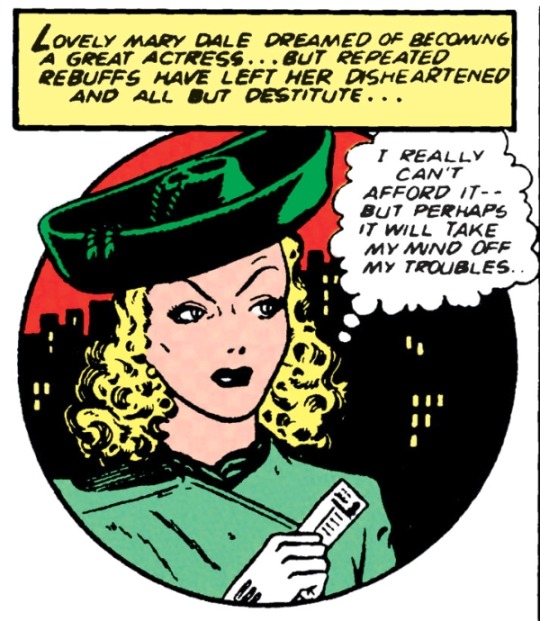
I'm not complaining, though. Actors/actresses are OP.
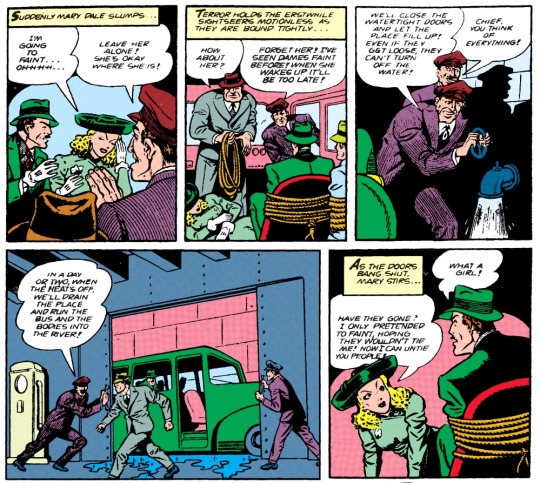
Detective Comics #93 (November, 1944)
3 notes
·
View notes
Text
popular — b. barnes x f!reader (18+)
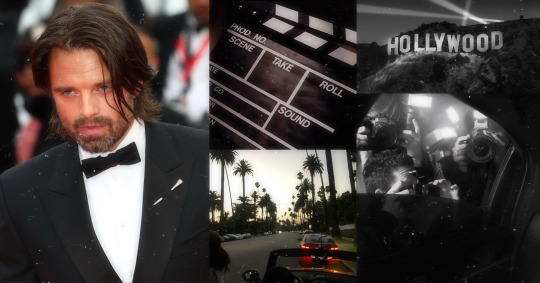
word count: 5.1K
summary: some people are destined to be famous, and others just need a little ..help to get there. what happens when an aspiring actress is given the opportunity to climb a little higher on the social ladder?
tags: mdni 18+ only, modern au, y/n is able bodied and uses feminine terms and pronouns, one-shot, power dynamic (reader is a struggling actress, bucky is a wealthy film producer) smuuuuut, oral (m! + f! receiving) unprotected sex (always wrap it before you tap it, folks!)
a/n: please be gentle it’s been a while… thank you to my bffs who read this first <3

The industry party is already half a blur by the time you get to your third glass of champagne. Los Angeles feels like it’s been chewing you up and spitting you back out for months, and while you’re good at faking confidence, lately you’ve been questioning whether this city has a place for you at all. The last agency you were with booked you for a toothpaste commercial and a recurring role as “Hot Girl #3” in a show that didn’t even survive its pilot. You’d had enough.
You’re about to retreat to a corner when a familiar voice calls out.
“Y/N!”
You turn, exhaling a relieved laugh when you see Joaquin Torres, your longtime friend and occasional lifeline in a sea of snakes. He pulls you in for a hug that smells like cologne and tequila.
“Thought I wasn’t gonna find you,” he says, glancing down at your drink. “You good?”
You give him a tight smile. “Define good.”
He winces. “That bad?”
You shrug, eyes scanning the glittering crowd of producers, actors, and people who only exist in photos. “It’s just all…exhausting. This is the latest I’ve been outside in over a month. I should be binging Real Housewives right now.” You say, and then almost as an afterthought, you add, “And these stilettos were not meant to be worn long term.”
Joaquin huffs out a laugh that’s mostly swallowed by the din of the crowd. “Well, tonight might be different,” He says, tilting his head. There’s a glint in his eye that you recognize; Clearly he’s up to something, and you don’t even have a chance to say no because he’s already reaching for your hand. “There’s someone I want you to meet.”
Your brows lift, but he anticipates your answer with an easy smile, disarming you before you’ve even had a chance to properly turn it—whatever he’s thinking—down. “Not Scorsese,” he says, a knowing smile on his face. “Bucky Barnes.”
You blink. “The Bucky Barnes? As in—”
Your stomach does a small, traitorous flip. You hesitate, your gut twisting with the now familiar cocktail of hope and dread. “I don’t know.. I’ve done this exact song and dance so many times.” You take a nervous sip of what’s left of your champagne, your eyes scanning the crowd once more. “I don’t think I can stomach another disappointment anyway.”
Joaquin studies you for a beat, but it’s clear his mind has already been made up and he’s not taking no for an answer. “C’mon. You’re not even auditioning for anything, not right now anyway.” He jokes, his hands coming to rest on your shoulders. “It’s just a little meet and greet, no harm, no foul.” He said, and with an exasperated sigh, you give in.
His hands slip from your shoulders, and weaves you through the crowd and toward the back patio, where golden lights bathe a group of people standing around with drinks in hand. That’s when you see him.
Bucky Barnes.
He’s not what you expected.
For all his credentials and the air of mystique that surrounds his work, he’s surprisingly…lowkey. He’s standing casually, one hand cradling a drink, while the other is stuffed into the back pocket of his jeans, listening to someone with an easy half-smile. He’s dressed in black, the sleeves of his shirt rolled, a few buttons left undone at the collar. He looks like someone who knows exactly what he’s doing—but doesn’t need to prove it.
You steel yourself.
“Buck,” Joaquin calls, breaking into the circle. “This is Y/N. She’s the actress I’ve been telling you about.”
Bucky looks up, and suddenly, all your nervous energy dulls. His eyes land on yours, and everything slows for a second. There’s no judgment in his expression, no boredom, no performative interest. Just calm curiosity.
“Y/N,” he repeats, like it tastes good in his mouth. “Nice to meet you.”
His voice is smooth, unhurried. You offer your hand, and he doesn’t rush the moment. Doesn’t scan you up and down. Doesn’t launch into small talk like he’s got somewhere better to be. “Nice to meet you,” you say, surprised by how steady your voice is.
He shakes your hand, and you can only hope that he doesn’t feel how clammy your palm is.
“I’ve heard a lot about you,” He said, and your gaze darts to Joaquin, who only gives you a grin and a thumbs up before stepping away.
“All good things I hope, though that would explain the ringing in my ears.” You reply, and he chuckles. The sound sparks something in your chest, but you choose to ignore it for the time being.
He glances at your almost empty champagne glass, and he gestures towards the party. “You want something better than whatever they’re calling champagne in there?”
You laugh—more than you meant to, but you go with it, nodding. “Yeah, I’d like that.”
He waves a waiter over, and orders a cocktail for you, and the two of you find yourselves in an easy flow.
The conversation that follows is effortless, surprising even you. You talk about the state of the industry, the uphill climb for actors like yourself, and how exhausting it is to be underestimated in rooms full of people who smile too much. He listens—actually listens—with a kind of calm intensity that makes you feel seen in a way you hadn’t realized you were craving. He wants to know what drives you. What kind of roles scare you. What you want to do that no one’s let you touch yet. It’s been so long since someone has looked at you like an artist instead of a résumé.
And he’s funny. Dry, understated. Every sarcastic quip you throw at him, he volleys back with ease.
When you call out the hypocrisy of producers who say they want “fresh talent” but only cast the same five people, he chuckles and raises his glass.
“To burning the house down.”
You tap your glass to his.
“To rebuilding it better.”
There’s a beat where the conversation lulls and neither of you fill the silence. You glance over at him, and he’s already looking at you, head slightly tilted, like you’re a puzzle he’s just beginning to enjoy solving.
“You know,” he says slowly, “I’m putting something together. Casting’s still in early stages.”
You arch a brow. “That sounds suspiciously like a pitch.”
“Maybe it is,” he says. “Or maybe it’s just an excuse to get dinner with you.”
You blink. “Dinner?”
“Strictly professional,” he adds, his grin betraying him.
You bite the inside of your cheek, trying to keep your cool. “I usually avoid producers who make vague offers over free cocktails.”
He laughs then—a genuine laugh, that makes the corners of his blue eyes crinkle. “Understandable. But I’m very persuasive, and I don’t make promises that I can’t back up.”
You pause, heart racing a little faster now—the traitorous thing. Then you nod.
“Okay. Dinner.”
He pulls out his phone. “Can I get your number?”
You give it to him, trying not to show the slight tremble in your fingers. He types it in, saves it, then looks back at you with that same, magnetic calm.
“I’ll text you,” he says. “We’ll talk shop.”
You nod, lips curving despite your best efforts. “Looking forward to it.”

You smooth your hands down your dress—a silky, low-cut number you’ve only worn once, and never with this much confidence.
You kept telling yourself it was just dinner.
You told yourself the extra twenty minutes you spent curling your hair wasn’t for him. That the subtle shimmer on your eyelids, the gloss on your lips, the soft sweep of highlighter on your collarbone—those were all for you. Because you wanted to feel your best. Simple. Empowering. Strategic, even.
It had nothing to do with how Bucky Barnes looked at you that night on the rooftop. Nothing to do with how your heart had skipped when he saved your number. Nothing to do with the way his voice had settled into your head and lingered there like a song you couldn’t quite shake.
Right.
He picked the place—low lighting, real candles on the table, waitstaff that smiled like they already knew his order. It was intimate but not too forward, elegant without being stiff. Like him. He stood as you approached, and for a beat, just stared. Not in the uncomfortable, lingering way some men did—but in that quiet, appreciative way that made you hyper-aware of your own skin.
The restaurant is dimly lit and intimate—modern Italian with moody lighting and quiet music. Definitely not the kind of place where deals are typically made.
You raise an eyebrow as you slide into the booth across from him.
“So,” you say. “What kind of role are we pretending to talk about tonight?”
Bucky laughs, tilting his head. “You always lead with sarcasm?”
“It’s a defense mechanism,” you say sweetly.
“I like it,” he says. “Keeps me on my toes.”
You fight the smile tugging at your lips as the waiter comes over. Bucky orders a bottle of wine without looking at the menu, and you wonder how someone can be so effortlessly confident without being unbearable. The waiter comes and goes. Wine is poured. Small talk is easy—dangerously easy.
Bucky asks about your recent auditions, your dream roles, the kinds of stories you want to tell. And when he talks about his work, his voice gets lower, more thoughtful, like he’s letting you in on something sacred. And you surprise yourself by how freely you answer. With most producers, it’s all strategy and filters. But with him, it feels easy.
Safe, even.
Still, there's something beneath the surface. A tension. A current.
It starts small. His gaze dropping a beat too low when you lean forward to reach for your glass. The momentary pause when his eyes catch the way the neckline of your dress curves—and dips.
You notice.
You definitely notice.
And when he looks up and sees you watching him catch himself, there’s a flicker of guilt in his smile—followed by something else. Something darker. Bolder.
“You’re staring,” you say softly, amusement coloring your voice.
He doesn’t flinch. Just leans back in his seat, expression relaxed but eyes locked on yours.
“Can you blame me?”
You tilt your head, letting your fingers toy with the stem of your wine glass. “You said this was strictly business.”
“I did,” he says, voice lower now. “And I meant it. But I’m not blind.”
He runs a hand through his hair, the movement slow, like he’s trying to ground himself.
“You walk in like the part’s already yours,” He says, eyes locked on you like he’s seeing something everyone else missed. “Then you start talking, and somehow you’re even better than how I pictured. You really think I’m not gonna look at you?”
Your lips part, heat rising up the back of your neck—and not just from the wine.
He watches your reaction, eyes flicking between your lips and your eyes, as if he’s waiting for you to shut this down. To draw the line.
You don’t.
Instead, you lean forward, just a little—enough to let him look if he wants to.
And he does.
“I thought we were here to talk shop,” You tease, your voice barely above a whisper.
“We are,” he murmurs, his gaze briefly flicking to your cleavage before snapping back to your face. “But you’re making it really hard to concentrate.”
You smirk, resting your chin in your hand. “Maybe I’m testing your professionalism.”
He exhales a soft laugh, eyes narrowing with playful suspicion. “So that’s what this is.”
You don’t answer, but the way your leg brushes his under the table speaks for you.
The moment hangs there, suspended in candlelight and tension.
Then you lift your glass again, cool as ever. “So. Tell me about this role you had in mind.”
He picks up his drink, but he’s not even pretending to be unaffected anymore. His voice is rougher around the edges now, dipped in something thicker.
“I think you’d be perfect for it,” he says. “But I’m starting to realize the real challenge is gonna be keeping things…professional.”
You smile, sipping slowly.
There it is.
That slow pull in your belly, the warmth that curls beneath your skin and spreads all the way to your throat.
He’s trying to behave. You can see it in the way he clenches his hands now and then. In the way his gaze keeps drifting—just below your neck, just a beat too long on your lips before he forces himself to look away.
“You’re making this very difficult, Y/N.”
Your smile widens, slow and knowing. “I haven’t done anything.”
“That’s the problem,” he murmurs, eyes flicking to your mouth again. “You don’t have to.”
You sit in the silence that follows, tasting the tension between you like the wine on your tongue. Part of you knows you should pivot—say something smart about your range or your process or whatever—but you don’t.
Because it feels good, being looked at like this.
Not like a product. Not like an audition.
Like a woman.
And Bucky Barnes, for all his restraint, is very much a man who’s interested.
The waiter comes with the check, and Bucky doesn’t even glance at it before sliding his card across the table. You let him. You don’t argue.
Outside, the night is cooler than before, and you shiver slightly as you step onto the sidewalk. Without thinking, he slips off his jacket and drapes it over your shoulders.
There’s a charged silence between you, and Bucky’s gaze lingers on your face, on the curve of your neck where the jacket slips just so.
He clears his throat. “I was thinking… maybe you’d want to come back with me. For a nightcap. Nothing fancy. Just some whiskey and quieter company.”
Your heart skips.
The sensible part of your brain screams No. You just met him, you barely know this man, and—let’s be honest—you’re tired of people promising things they don’t keep.
But the reckless part—the part you’ve been trying to ignore—whispers Yes. Yes to a night where you forget the struggle. Yes to being wanted. Yes to whatever this is.
You hesitate, searching his eyes for any sign he’s not serious.
He’s watching you, patient. Respectful. But there’s something fierce beneath it, an invitation you can’t quite refuse.
Finally, you breathe out.
“Okay.”
He smiles, half-relieved, half-triumphant, then holds out his arm. You wrap your hand around his forearm, and together you walk towards the sleek, black car he’d parked just around the corner.

The door to Bucky's penthouse clicks shut behind you with a low thud that seems to echo through the sleek, open space. You step forward slowly, taking in the minimalist design, all dark wood, clean lines, and soft lighting. Floor-to-ceiling windows overlook the city skyline, glittering like spilled diamonds.
“This is…” you begin, turning in place to admire the view.
“Overkill?” Bucky cuts in, lips twitching.
You smirk, shrugging off his jacket and laying it over the back of a velvet armchair. “I was gonna say impressive. But sure, overkill works too.”
He chuckles and makes his way to the bar in the corner, where a decanter of dark amber scotch glows under the low light. You follow, watching as he pours two generous glasses, his forearms flexing as he lifts the crystal bottle.
“Thanks for coming,” he says, handing you a glass.
You take a sip—smooth, smoky, expensive. “I figured I owed you a nightcap after dinner.”
His eyes flick down your body before snapping back to meet yours, and this time, there’s no polite veil. No public persona. Just him. And you.
“You don’t owe me a damn thing,” he says quietly. Then adds, with a crooked grin, “But I’m sure as hell glad you’re here.”
You blink once. Twice. “Well,” you murmur, swirling the liquid in your glass, “You did say you wanted to talk more.”
“I did.” He throws back half his drink in one gulp, eyes still locked on yours. “But let’s be honest, sweetheart. I didn’t bring you up here to talk about casting calls.”
There it is.
Blunt. Shameless. Heat flares low in your belly.
He watches the way you react—how you shift slightly on your heels, your breath catching just enough to betray your interest. He sees everything. He’s looking now, really looking. At your mouth, your neckline, the rise of your chest under your blouse. His gaze drags over you like a physical touch, and he doesn’t bother hiding it anymore.
“You’re gorgeous,” he says simply, the words landing like a strike to your core. “You walk into a room and every man forgets his name. But what gets me the most—what’s driving me fucking insane—is that mouth.”
Your lips part, stunned at the turn. “My… mouth?”
He steps closer. His glass clinks softly on the counter as he sets it down. “You’ve got this sharp little tongue and all I can think about is what else you could do with it. Now that we’re alone, I’m not in the mood to play coy. I want you, Y/N. Plain and simple.”
You don’t speak. You can’t. Not with him standing this close, not with the way his voice has dipped low and rough like velvet dragged over gravel. The warmth of the scotch turns molten in your chest. He steps forward, each stride measured, confident, until he stands just a few feet away from you. The low light accentuates the angles of his face—his jaw, his cheekbones—making him look predatory in the most intoxicating way possible. You glance at his mouth, then back up—his expression hungry, dangerous, focused.
You finally find your voice. “Do you usually mix business with—”
“I don’t,” he cuts in. “But I’ve been thinking about you since the second Joaquin introduced us. And I’m not about to stand here and pretend I’m not imagining how you’d sound underneath me.”
Your knees nearly buckle. He’s still not touching you, but you feel the pull in every inch of your skin, every nerve ending tuned to the moment he might.
“And if I said I wasn’t here for just a nightcap either?” you ask, voice barely above a whisper.
A slow, sinful smile spreads across his face. “Then I’d say stop pretending, and let me show you exactly how much I want you.”
You don’t wait. You set your glass down beside his and he closes the distance, your fingers curling into the fabric of his button-down. His hands are on you in an instant—one at your waist, the other sliding up your spine. He kisses you hard, deep, like he’s been holding back all night and has finally cracked. His mouth is demanding, tongue sliding against yours, teeth grazing your bottom lip as he exhales a growl into your mouth.
You gasp as he lifts you without warning, setting you on the edge of the marble counter. His hands slide under the skirt of your dress, thumbs dragging along your thighs until they reach your hips.
“Tell me to stop,” he murmurs into your neck, already knowing you won’t.
“Don’t even think about it.”
That’s all he needs.
He slips one hand between your thighs, fingers dragging along the damp heat between your legs through your panties. His groan is immediate, deep and primal. “Fuck,” he breathes. “You’re soaked.”
You tilt your head back as he mouths at your throat, sucking a bruise just beneath your ear. “You’ve been driving me crazy all night in this little dress, pretending you weren’t doing it on purpose.”
“I wasn’t,” you lie, breathless.
His eyes flash as he pulls back to look at you. “Sweetheart, you wore this knowing damn well I wouldn’t be able to stop looking at your tits all night.”
You bite your lip.
“See? Not denying it now,” he murmurs, hooking his fingers into the waistband of your panties and dragging them down, slow and deliberate.
He drops to his knees, parting your legs, and when his mouth finds you, your head hits the cabinets behind you. He’s not gentle—he’s ravenous. His tongue moves with confidence, circling, flicking, devouring until you’re moaning, shaking, fisting his hair as he pushes you closer to the edge.
“Bucky—” you gasp, thighs trembling as he grips them tighter.
“I know,” he murmurs, mouth still moving against you. “Come for me, sweetheart. Let me taste you.”
And you do—your body snapping tight as your orgasm crashes over you. He doesn’t stop until your hips buck, until you’re whining and breathless and begging him to give you a second to breathe.
He rises, mouth glistening, and kisses you again—filthy and deep and tasting like you. Then he scoops you off the counter and carries you down the hall toward his bedroom.
The bedroom door closes behind you, and the room is dim, lit only by the soft glow of streetlights filtered through the floor-to-ceiling windows. A king-sized bed dominates the space, sheets the color of storm clouds draped neatly across the mattress.
Bucky doesn’t waste a second. He steps in front of you, pressing you against the wall with a force that sends your breath scattering. One hand tangles in your hair, tilting your head back so he can lean in and kiss the column of your throat. The other hand works on the infuriatingly tiny zipper to this damned dress. He’s about to tear the damn thing off of you, but he finally manages to unzip it.
The dress pools at your feet like water, and his eyes trail shamelessly down the length of your almost-bare body, lingering on the swell of your breasts and the curve of your hips with an audible, appreciative exhale. He presses hot kisses along the valley between your breasts, and then back up again.
“On your knees,” he murmurs, voice thick. “I’m half-hard, and I want you to take care of it.” And you nod obediently. He snatches the pillow from his bed, tossing it at your feet before you kneel before him.
You reach for his belt buckle; fingers fumbling just enough that he chuckles low in his throat. With an impatient sigh, he hooks his thumbs into his belt loops, jerking his jeans down in one swift motion until they puddle around his ankles along with his boxers. The sight of him—naked, upright, unashamed—makes your fingers tremble as you close the gap again, dropping to your knees.
His cock is already slick with precome, aroused at the thought of you. When you take him into your hand and slide the head across your lips, he shudders, throwing his head back softly. You swallow him slowly, lips gliding from head to base, tongue flicking against the sensitive underside. Already he’s gripping your hair, gentle but firm, encouraging you without forcing. He groans, hips jerking ever so slightly, and the vibration through his length is electric against your tongue.
“Fuck,” he rasps. “Just like that. Don’t stop.” He leans against the wall, one hand bracing him while the other fists your hair. You swirl your tongue around the head, then hollow your cheek in a speedy, almost desperate motion. His breath hitches, and his eyes close as though he can’t bear to watch.
When the coil in his body tightens, he pulls you from him and helps you stand, his mouth on yours again. You’re acutely aware of every curve: collarbone, breasts, the hollow at your sternum. He cups you, thumbs brushing over your hardened nipples, eliciting a soft moan from your lips. “Fuck, you’re gorgeous,” he murmurs, voice husky. “So perfect.” He flicks his tongue across one nipple, then the other, and you arch into him, mouth falling open.
His clothes—and yours—have long since been discarded on the floor, a trail of temptation from the hallway to the bed. He pushes you down onto the mattress with a steady hand on your shoulder, the sheets cool against your heated skin. You sit up on your elbows, breath catching in your throat at the sight of him: thick, heavy, and achingly hard, veins pronounced along the length, his tip flushed and glistening. Every part of him is sculpted, taut with restraint, like he’s been holding back since the moment he laid eyes on you. And now, he isn’t.
He stands at the edge of the bed, his hand wrapping around himself with deliberate, unhurried strokes, gaze fixed on you like he’s memorizing every inch of your body—the way your lips part in awe, the way your thighs instinctively press together in aching anticipation.
“You want this?” he rasps, voice ragged with desire. His thumb swirls over the slick head of his cock, drawing a low hiss from his throat. “Tell me you want me, baby.”
You shift closer to the edge of the bed, legs spreading wider, like you’re offering yourself up to him. “Quit being a tease,” You murmur, eyes locked on his cock as he strokes it slowly, “And come fuck me like you mean it.”
He groans at your boldness, that shameless invitation tipping him over the edge of restraint. He pulls you closer to him, then steps between your spread thighs, the heat of his body searing against yours. His hands roam your sides—firm and possessive—before gripping your hips with purpose. You can feel him, thick and pulsing, as he drags the head of his cock along your slick folds, lining himself up with a low, reverent curse.
“Fuck, yes,” he growls, barely holding back, and then he thrusts in.
The first thrust is slow but impossibly deep, stretching you inch by inch until your breath escapes in a broken gasp. He fills you completely, the pressure overwhelming, perfect. He pauses there, buried to the hilt, savoring the moment as your body tightens around him. And then—he moves.
His rhythm starts punishing and purposeful, each thrust punching the air from your lungs, knocking moans out of you that you don’t bother to muffle. Your fingers claw at his shoulders, nails dragging down the sculpted muscle as he pounds into you, over and over, hitting that spot that makes your toes curl. The bed creaks beneath the force, his hips slamming into yours with delicious brutality.
Bucky’s free hand braces against the headboard, gripping it so hard his knuckles go white. His head falls back, sweat-damp hair brushing his temples, jaw tight and mouth parted on a ragged groan as he loses himself in the feel of you—tight, wet, wanting.
You can feel every inch: his cock slick and hot, the way your walls clamp around him with each pass, the slick, wet friction. Your breaths come in ragged pants, and you hook an arm around his neck, tugging him down for a fierce, open-mouthed kiss. Tongues collide, teeth graze, and in that kiss you taste the same hunger you feel in your core.
He pulls back just enough to stare into your eyes, voice rough. “You’re unbelievable,” he mutters, then drives into you faster. “So fucking wet for me.”
You moan, head falling back on the pillows as he hammers into you. The thrusts come harder now, each one a sharp stab at the center of your heat. Your cunt clenches around him, and you can feel the coil tightening—your orgasm building like a star about to explode.
“Bucky!” you cry out, fingers carding through his hair. “Oh God, Bucky—”
He dips his head and sinks his teeth into the hollow of your collarbone, and a bolt of heat races through you, shattering whatever control you had left. Your back arches off the mattress, hips lifting into him as a tidal wave of white-hot pleasure crashes over you. Fingernails graze his shoulders, leaving trails of need, while your breath tears from your lungs in ragged gasps.
He doesn’t relent. With one last series of punishing, relentless thrusts—each harder, each deeper—he drives you even higher. His voice breaks as he grunts your name like a benediction, and you feel the weight of him shuddering as he swells and spills into you. Your body trembles beneath his, every muscle trembling in the aftershock of his release. Then, spent and utterly raw, he collapses beside you. Together you lie there, chests rising and falling, hearts pounding, breaths mingling in the hushed stillness of the penthouse.
The city hums quietly beyond the penthouse glass, a soft backdrop to the silence stretching between the two of you. The air still smells like sex and skin and scotch, and your limbs feel heavy—sated, warm, anchored beneath the lazy sprawl of his arm around your waist.
Bucky’s chest rises and falls gently, the heat of him pressed against your chest. His fingers graze slow circles into the dip just below your navel, but otherwise, neither of you moves. Not yet. Not when everything is still humming between you.
You let the quiet sit for another beat before speaking, your voice sleep-rough and teasing.
“So… that role you were pitching to me earlier...”
He freezes above you. Just for a second.
Then a breathless laugh bursts out of him, low and startled. “You’re unbelievable,” he murmurs, burying his face into the crook of your neck with a groan. “Jesus Christ, Y/N. We just had the kind of sex people write bad poetry about, and you’re still chasing your next gig?”
You smirk, tilting your head to glance at him. “I’m just saying. If you’re done defiling me, I’d like to circle back to the business portion of this evening.”
He laughs again—truly laughs this time, the sound warm and sharp and so completely disarmed that it makes your chest squeeze a little.
“You’re fucking ruthless,” he says, still grinning as he tightens his arm around you, tugging you closer like he already doesn’t want to let go. “Alright, alright. We’ll talk casting.”
You smile, eyes fluttering closed as you sink deeper into the pillow. He kisses your shoulder once, slow and lingering.
“In the morning.”
#bucky barnes#bucky barnes x reader#hollywood au#marvel#x reader#sebastian stan#sebastian stan x reader#actress au#joaquin torres#celebrity au#oneshots#oneshot#fanficition
97 notes
·
View notes
Note
hi,i love your analysis :D
could you expand more on the struggles that uika may have faced be it internal or external
Hello! I'm glad you enjoy my thoughts, that's very kind of you!
Regarding Uika's struggles, I'll admit we don't truly know yet what her struggles are (which is part of why I enjoy picking her apart so much, so I can try to get closer to her truth before the anime airs!) so this will lean more towards assumption... but here's some of the thoughts that I've rolled around in my head!
Short answer: external struggles include a physical separation from Sakiko that she had to get a job to overcome, regarding her internal struggles I highly recommend reading the concert intermissions for, because her dialogue in them is very raw and I'm pretty certain the things Doloris has said apply to Uika.
Social class issues. I don't necessarily think anything points to Uika being poor, but I do think there's something to be said about this girl who's a first year like everyone else, and yet she has to work a full time idol job, to the point she leaves class early. To put this in perspective, Taki works part time (at a fairly relaxed minimal wage job) which I interpret to be her way of giving herself things to do, Nyamu streams but we don't know her education history and even then getting job security was her incentive to join Ave Mujica, and the only other character in these bands who works is Sakiko herself. With Uika, yes she aspired to be an idol, but she's pretty clearly exhausted in every shot we've seen of her in Sumimi, which makes me wonder if money could be a stressor for her. I do think this plays more into her psyche itself than the money thing admittedly, but it's worth pointing out. Regardless of that, I do think there is some class differences going on that could bother her; when she met Sakiko, she thought Sakiko wouldn't give her the time of day, which to me implies she's lower class (and thus could potentially have room to feel insecure). From my current understanding, Uika grew up isolated on an island and the only way someone like her would be able to get to Tokyo (and thus reunite with Sakiko) would be to become an idol and get gigs in agencies there. The other girls didn't have to work as hard as she did to reach the same point. Also of course, during Ave Mujica's 2nd concert, Doloris went on a long tangent about class differences and how they trample kind people, who can only smile through such pain. Which to me sounds like she's talking about herself...
Some level of generalized depression... which we don't know the circumstances of currently, but you cannot talk about Uika without discussing Doloris, who is represented by her sorrow. Some Doloris comments that stand out to me: feeling as if her existence is miniscule, feeling like she's not allowed to dream because it's all just unfulfilled delusion, wanting to escape from reality (!!!perhaps Uika wants to escape reality in the form of becoming Doloris), feeling like an empty husk who has no personality of her own (could be characterized by her centering herself around her feelings for Sakiko first and foremost, and how Uika from Sumimi=/Uika Misumi; it's all just a role she's playing to give people the impression she's more of a person than she actually is), wanting to die and be reborn so she can start over with the one she loves most, wanting to be accepted for all of her ugliness, hiding herself behind a mask so much to the point it's become her skin... she has a lot of self-loathing, more so than the other dolls do (though Mortis gives her a run for her money). Given the anime trailers have shown us the dolls as much as the actresses, I do fully expect all of these themes to apply to Uika herself, even if we don't know in what ways currently.
In general, I do get the strong impression that she feels like she doesn't exist unless someone else is looking at her. Which I did talk about in depth in my Uika/Doloris writeup, but it's always worth reiterating.
I've been wondering a lot if she feels some level of abandonment from Sakiko in the time they didn't talk. She was staring at her messages so obsessively, and in the concerts, she talks about a girl she loved so deeply who cast her aside. It got to the point she started to believe that such a dream could only ever be a delusion she had. These themes line up with what little we currently know about Uika's feelings for Sakiko, and her saying in the new trailer that her dream was to be by Sakiko's side forever only further cements this for me. Really, we know so little about Uika except that she loves Sakiko, so for the one she loves most to not "need" her in her life for so long surely has to be a big struggle for her, to put it lightly!
There's definitely more going on with her than mentioned here (I actually have been sorting my thoughts out on the contrast between her and Tomori in hopes of writing a complete essay analyzing them, where I'm sure I'll come up with all sorts of new crazy things), but I hope that put some perspective on her feelings as we currently know them!
#answered#seine writes#uika misumi#sorry for the delay on this!#wanted to let the right words come to me before answering
17 notes
·
View notes
Text
Keys to Crafting Characters Readers Will Root For (w/ some examples)
As a writer and while making up this blog, I’m quite adamant that characters are just as important (if not more) as plot. In the grand scheme of things, an active, relatable, and engaging main character is crucial for a novel's success. But how exactly do we make a character all these things? There’s many ways, in fact. It is up to us as authors to keep track and manage the developmental arc of our protagonist: primarily, who they are on the inside, and how they grow or change / adapt to the situations or people around them.
Here are some examples and tips to help you develop a compelling protagonist (or all kinds of characters). Keep in mind these tips are at their most basic, essential level (there’s just so much that can be explored in each one), so I hope to go further into each point sometime in the future.
~`* They have clear goals and motivations.
First things first: you’d want to clearly define your character's goals and motivations — and the sooner, the better. Proper and well-set goals and motivations provide a sense of direction to the narrative. They should be specific, measurable, and achievable — or perhaps, not achievable, at least to its fullest extent. This would ultimately depend on the type of arc or ending you intend to write for your story, but there should at least be some main goal the character is vying for, and a motivation that dictates how much they want or need it.
For example: An aspiring actress hoping to make it to the stage and audition for the lead role in her favorite play. —> Why does she want to be an actress so badly? What does it mean to her to act in her favorite performance? What does she have to prove, to herself or others?
~`* They are flawed, yet relatable:
I’m sure you’ve all heard this before… but I’m still going to reiterate:
Your character should have relatable flaws that readers can sympathize with. It’s no secret that flaws make characters human and relatable. Flawed characters help us remember that nobody’s perfect, and that we’re not alone in our struggles and in our plights (stay back, Mary Sues!). These flaws can be anything, from fears, limitations, biases, misbeliefs, quirks, shortcomings, or behaviors. It’s useful two have at least two: a minor flaw and a major flaw, where the former affects only the only character and nothing else, and the latter hinders the character and affects the plot.
For example: A highly-knowledgeable yet socially awkward and oblivious professor who can hold a bar of soap better than a conversation. —> Does this flaw make him out to be charming or weird to others? How can his social-awkwardness affect the plot… does it hinder him from connecting to his students or colleagues?
~`* They have unique talents or interests.
Sometimes I read a story, and personally I have a hard time connecting with a character if all they care about from beginning to end is what’s happening in the plot. It’s like they exist for the sole purpose of the plot, and are nothing but a shell to see through the events or its challenges. This is understandable, especially when it’s an action-packed story or thriller.
Personally, I can’t help but wonder what its main character does for fun. What they’re like before the events of the novel.
I think it can be useful your character skills or interests that set them apart. This not only makes them interesting, but can drive the plot in unexpected ways. *Bonus points if they have a particular skill or hobby that conflicts with the way they present themselves to others, or if they hide it well if they are embarrassed by it or afraid of getting judged. Essentially, this is all to clue-in on the reader to the character’s backstory, their personality. It helps them seem more individualistic, like humans with their own sets of interests or ideas that give them more complexity and uniqueness. This can also be useful in creating parallels or connections to your story’s themes or your character’s arc.
For example: A brave warrior with an aptitude for gardening and flower arranging. —> Seems random, right? But what if this warrior had workin in their relative’s flower shop, and has kept the skill alive in their days of battle to see pieces of beauty around them, hope from fear and danger? They might dig graves of their fallen friends and leave behind flowers in remembrance. Just an obscure example, but see all the possibilities something like this can open up?
~`* They have deep, complex relationships.
Sometimes we can get a better idea of a character when we see them interact with the people around them. It’s like showing vs. telling, where we get a firsthand look at how the main character treats his family members, how he accepts or refuses help from those he’s close with, what he appreciates most about his significant other, how he feels about the annoying neighbor next door. Who’s the one person they most admire and never want to let down? Who’s the one person they despise with all their body and soul? Whether it's friends, family, enemies, or romantic entanglements, complex interactions and relationships add layers to your character and in how they showcase themselves to the world.
For example: An excellent, compassionate therapist with a strained relationship with his own family member. —> How does this character feel about this kind of relationship? Does it stem out of shared family troubles, or something deeper? Is there a glimmer of possibility the therapist might reconcile with this relative, or are they dashed because of mutual pride or distrust?
~`* They often face moral dilemmas.
It’s time to get philosophical. Human nature is full of paradoxes and tough moral questions, and so characters with conflicting qualities can be intriguing and relatable. Introduce moral dilemmas and conflicting values that force your character to make tough choices and confront their conflicting values. Do they have a friend with conflicting beliefs that challenge their own? Are they forced to act a certain way because of external pressures? Are they forced to choose between saving one person while destroying another?
No matter how serious this dilemma is, you can also add a moment of clarity or self-awareness for your character. This can be a turning point where they acknowledge and confront the conflict within themselves, thus becoming face-to-face with their internal crisis and how they decide to go from there. Do they weigh the pros and cons considerably, do they fumble because they’re hesitant, or do they embrace the new changes?
Despite conflicting values, make sure your character's behavior is consistent with their established personality. Consistency helps maintain authenticity and keeps the character grounded.
For example: A scientist torn between protecting humanity and the pressure of making a groundbreaking discovery. —> How does making this discovery very important to this character? What do they stand to lose… what do they stand to gain? Are they at the risk of becoming something completely opposite of who they were at the beginning of the story, losing their sense of morality or forced to choose a side?
~`* They show their quirks and habits.
Introduce quirks or habits that make your character memorable. These little details can make the character more relatable and interesting, because just like talents or hobbies, this can also give a clearer sense to the reader of what kind of personality the character has and what they’re like. Not to forget, it also helps them to stand out from other characters on the page, giving them a unique voice with their kind of dialogue, their behaviors, style, and mannerisms.
For example: A scholar who can focus only if she’s chewing gum or wearing her lucky ring. —> How might’ve this character started this habit or tradition? Does it actually work? Does it not work, but they still do it anyways because it’s comforting for them? Also, where did they get this quirk from?
~`* They have a backstory.
Most of what we’ve been discussing in this post already leaves some framework for the character’s backstory. It’s important to have a meaningful backstory in mind that influences the character's present actions and explains why they are they way that they are. This adds depth and helps readers understand their fears, desires, and motivations better; not shallow and two-dimensional as cardboard cut-outs.
Sometimes we don’t get a backstory for our character right away. Backstories takes time to brainstorm and shape — let alone into a complex or compelling one — but its helpful to trust the process. What you can do if you’re still looking for the right one, is to ask yourself questions on things that matter to you most. This pertains to your story’s themes and other main ideas you may like writing about, such as grief or family matters. It all boils down to who your character is (the present), and where it stemmed from (the past). If we take this a step further: does this backstory guide them or force them to make changes within themselves, thus leading to their changed self at the end of the novel/series (the future)?
For example: A woman with a fear of marriage because she’s seen firsthand its faults, including her own parents’. —> Is her parents’ divorce still something she’s struggling to come to terms with? Is her misbelief equating marriage to constant conflict? Does she have a secret desire to get married, yet it put off by its pressures? Does she make up for this fear by focusing on other matters? Will this fear later be disproven?
~`* They are often vulnerable.
Every hero needs vulnerabilities. Imperfections. Weaknesses. We’ve talked about strengths and flaws before, but giving them that dent in their armor, any little opening someone or something might get through, leaves a reminder that no one, especially our hero, is invincible. Nobody’s perfect, after all (side-eyeing you, Mary Sues…). Make your characters messy: adding vulnerabilities helps makes them more authentic and genuine, opening up chances for them to learn and evolve as the story moves along.
It can also add a layer of suspense to the story, especially in conflict and tension. How will the character handle someone breaking their walls down, or a bad experience threatening to make them crumble and fall back to old habits? How do they handle their insecurities? How well do they hide their fears, and will they ever admit them?
For example: An old woman with bad eyesight and lives alone can’t tell that the reluctant robber breaking into her home is not her grandson. —> This is a fun little example that opens up many possibilities. Her bad eyesight is a physical vulnerability, and so is her soft spot for her supposed grandson. The robber notices this, and he too may have a soft spot for any old woman who treats him kindly. Does he use this to his advantage to rob the house, or does he humor her for a while?
I’d definitely like to expand on these tips sometime. If there’s anything you’d like to share or add, please do so! I’d love to hear y’alls thoughts. Hope this helped!
#on writing#writing advice#creative writing#fiction#writing#writing tips#character#story tips#story conflict#writeblr#writers on tumblr#writers and poets#bookblr#quick writing tips#writers#writerscommunity#writer things#helping writers#writing inspiration#help for writers#how to write#writing tips and tricks#writing help#fiction writing#writer tips#writing tools#writer stuff#writing resources#writers of tumblr#writing community
67 notes
·
View notes
Text
David Lynch's Mulholland Drive
Considered the genius of dreamscape cinema, Lynch befuddled and mesmerized moviegoers with this 2001 tour de force
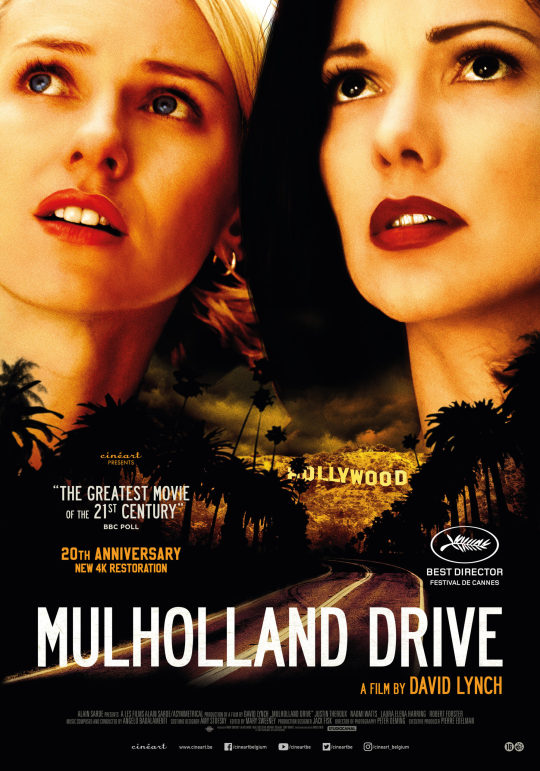
Our sleeping dreams are a conundrum. They are nonsensical, host a barrage of bizarre characters and present as fragmented parts of our psyche. David Lynch, a visionary auteur like no other, took those dream-state components and turned them into a compelling, cinematic art form during the course of his 58 year film career.
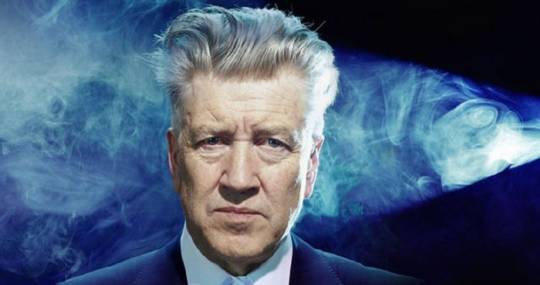
Mulholland Drive is Lynch's 2001 dreamscape opus. The film premiered a decade after Twin Peaks ended, and while there are a few scenes with a distinct Peakian feel, Mulholland Drive stands alone as a cinematic masterpiece and a mesmerizing, befuddling story.
The film revolves around two characters: Betty and Rita. Betty is an aspiring, starry-eyed actress who who arrives in Hollywood looking for her big break. Betty lives rent-free in her aunt's apartment and she's so talented, a single audition garners her the lavish attention of VIP's at a major studio. Her good luck seems to come in spades. That is, until she meets Rita, a tragic beauty who suffers from amnesia after surviving a horrific car accident. Betty bonds with Rita, vowing to help her recover her identity. But good intentions take an ominous turn when they stumble upon a mystery that flips reality on it's head, ultimately begging the question: did Betty and Rita even exist?
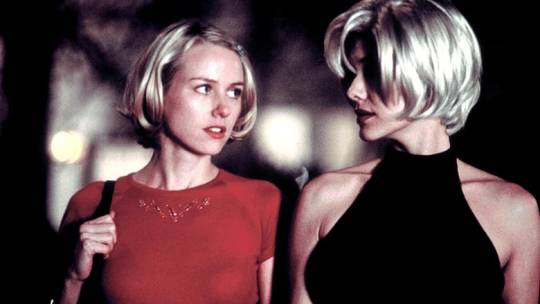
Naomi Watts's exquisite portrayal of Betty garnered her international stardom after a decade of struggling in Hollywood.
The film takes a dramatic shift into a different plane of reality when Betty and Rita are suddenly two different people and their fortunes have reversed. It's difficult to for the viewer's mind to catch up to the radically altered storyline. Several sub-plots and and fractured loose-ends later, the viewer is left wondering if anything they've seen onscreen is going to come together to make a concerted whole. Unanswered questions abound: what the heck happened to Betty and Rita? Who are the elderly, genteel couple at the airport who turn garishly evil? What about the homeless man who appears vital to the plot but fizzles out? Is that Billy Ray Cyrus?
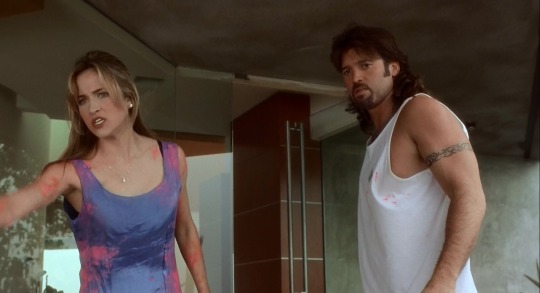
Billy Ray plays an achy-breaky pool man in Mulholland Drive
The Lynchian rub is this: there is no piecing this film together. The story is fragmented, spellbinding and multi-plotted with an odd cast of characters - like a dream. Lynch insisted that he wanted no meaning assigned to it.
The mystery held true for the actors during filming. In a 2015 Criterion interview, Naomi Watts said "Of course we always had questions: "Does this mean that?" "Is that why she's going here?" and "Who is that character?" And he (Lynch) would delight in the mystery of it and not give any information that you needed."
Justin Theroux confirmed the same, saying: " I think people who try to break it down...are going to end up frustrating themselves because there is no connective tissue between certain things. And that's OK."
Mulholland Drive splintered critics and movie-goers alike with it's choppy, hard to grasp storylines and twisted neo-noirness. But it's a movie that stays with you, a story that reverberates in your head as you attempt to grasp at some meaning behind the dark, gritty images and tragic characters presented onscreen.
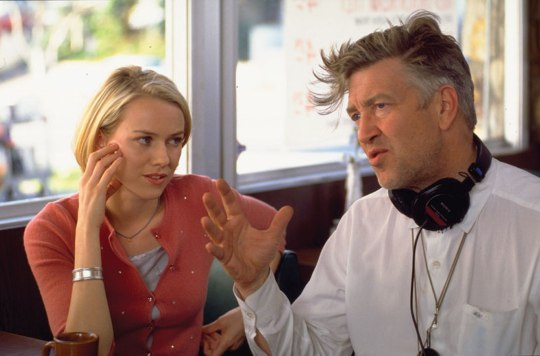
RIP to the great David Lynch, who won Best Director at Cannes Film Festival in 2002 and garnered an Academy Award nomination for Mulholland Drive
During his lifetime, Lynch was recognized for his unique storytelling and brilliant filmmaking gifts. Now that he is gone, he will be celebrated as one of the greats. Mulholland Drive, arguably his best film, serves to cement his legacy as a cinematic genius.
7 notes
·
View notes
Text
Twilight Oc
Face Claim: Hedy Lamarr
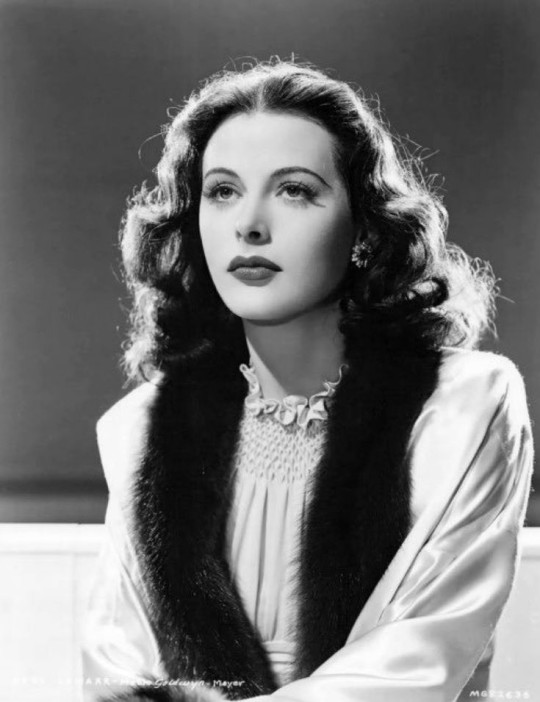
Backstory:
Name: Vivienne Moreau
Date of Birth: June 18, 1889
Date of Transformation: February 2, 1912
Place of Birth: Paris, France
Special Ability: Charismatic Persuasion – Vivienne can subtly influence others’ thoughts and emotions, making her exceptionally persuasive and captivating
---
Backstory:
Vivienne Moreau was born into a modest family in Paris, France. Her striking beauty and natural charm drew attention from a young age, and she aspired to rise above her humble beginnings. By the early 1900s, she had become a renowned actress in silent films, hailed as one of the most mesmerizing women of her time. Her performances captivated audiences worldwide, making her one of the first international film stars.
Despite her fame, Vivienne’s personal life was fraught with challenges. She was fiercely independent, rejecting societal norms that sought to dictate a woman’s place. However, her relentless schedule and dedication to her craft took a toll on her health. At the height of her career, Vivienne was diagnosed with tuberculosis, a devastating disease at the time. The news sent shockwaves through her fans and the film industry, as her illness became public knowledge.
Desperate for a cure, Vivienne sought out Dr. Carlisle Cullen, whose reputation for miraculous healing had reached her ears. She met Carlisle in New York City while filming her last movie. Upon examining her, Carlisle realized the severity of her condition and the slim chances of recovery. Moved by her determination and spirit, he made the difficult decision to offer her immortality.
Vivienne initially struggled with her transformation. Her eternal beauty felt like both a blessing and a curse. She mourned the loss of her human life and the ability to pursue her passion for acting in a world that now feared and misunderstood her kind. However, her charismatic nature and sharp wit helped her adapt to the vampire lifestyle.
---
Life as a Vampire:
Vivienne became a member of the Cullen family, finding solace in their compassionate and ethical approach to immortality. She admired Carlisle’s wisdom and Esme’s kindness, often seeing them as parental figures. Over time, she embraced her new existence, using her powers to protect and guide others.
Vivienne’s charisma allowed her to navigate human society with ease, and she often acted as the Cullens' spokesperson when blending in with humans was essential. She occasionally ventured into the arts, working under pseudonyms to create timeless pieces of cinema or theater, although she always kept a low profile.
Despite her acceptance of her new life, Vivienne harbored a deep-seated longing for her human past. She kept a collection of her old films, watching them in solitude to remind herself of the woman she once was. This duality—her love for humanity and her eternal vampire nature—made her both a source of strength and vulnerability within the Cullen family.
---
Personality:
Vivienne is intelligent, poised, and fiercely protective of those she loves. Her years in the spotlight taught her how to navigate complex social situations, making her a natural diplomat. However, she often hides her pain behind a façade of confidence, and only those closest to her know the depths of her sorrow.
Her love for the arts remains a defining aspect of her personality, and she frequently encourages others to find beauty in the world despite the hardships of life. Vivienne is also deeply loyal and willing to fight for what she believes is right, making her a valuable ally and a formidable adversary.
---
What do you guys think?
5 notes
·
View notes
Text
Brushstrokes & Spotlight: The Lasting Impact of Jean-Michel Basquiat and Cicely Tyson
Two Icons, Two Legacies—One Short, One Long, Both Unforgettable
Some artists leave their mark in an instant, while others build a legacy over a lifetime. Black History Month is a time to reflect on those lasting contributions, but for me, Jean-Michel Basquiat and Cicely Tyson’s impact is something I carry all year round. Their work speaks to me in different ways—one through vibrant, chaotic strokes on a canvas, the other through powerful, intentional performances on screen. One burned brightly and briefly, the other illuminated the world for decades. Yet, despite their different journeys, both challenged perceptions, reshaped Black artistry, and left behind legacies that still move and inspire me today.
Jean-Michel Basquiat: A Short But Powerful Legacy
I have always been fascinated by Jean-Michel Basquiat’s work. There’s something electric about it—raw, chaotic, and deeply layered with meaning. Though he lived only 27 years, he created an artistic language that spoke to the struggles and triumphs of Black identity, history, and existence.

Basquiat originally aspired to be in the medical field, and you can see that influence throughout his work. His paintings often feature skeletal structures, anatomical references, and disjointed figures, almost as if he was dissecting the world through his brushstrokes. His signature use of crowns symbolized Black excellence and royalty, reclaiming a space in art that had long excluded people who looked like him.

What makes Basquiat’s work so important is how it blurred the lines between graffiti and fine art, between street culture and high society. In an era when Black voices in the art world were marginalized, he forced the industry to pay attention. His influence can be seen everywhere—from hip-hop culture to contemporary artists who embrace his bold style and fearless storytelling.
Cicely Tyson: A Lifetime of Grace and Strength
Unlike Basquiat, Cicely Tyson’s career was not a brief flash of brilliance—it was a slow-burning, steady flame that illuminated screens and hearts for over seven decades. I grew up watching her in movies and TV shows, always mesmerized by how she carried herself with such grace and poise. She wasn’t just an actress; she was a representation of African American women in their fullest, most dignified form.

After reading her autobiography, Just As I Am, I was even more in awe of her. She never intended to write her life story, but I’m so glad she did. In it, she shares her journey with raw honesty—from her early struggles in Harlem to breaking down racial barriers in Hollywood. She refused to take roles that perpetuated negative stereotypes of Black women, which meant turning down a lot of opportunities. But in doing so, she paved the way for future generations to be seen as strong, complex, and dynamic human beings, not just as side characters in someone else’s story.

One of the most profound takeaways from her book is her belief in purpose-driven artistry. She never pursued acting for fame or wealth—she saw it as a tool for storytelling, empowerment, and change. Her work wasn’t just about what was on the screen; it was about changing the way Black people were perceived in media and society as a whole.
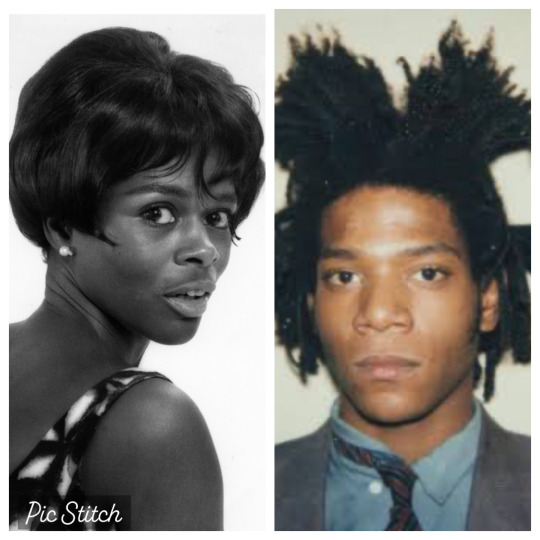
Artists, One Mission: Defining Black Excellence
At first glance, Basquiat and Tyson couldn’t be more different—a rebellious painter versus an elegant actress. But at their core, both were storytellers using their craft to change narratives.
Basquiat painted the struggles, triumphs, and raw realities of Black identity, often confronting society with brutal honesty.
Tyson performed with an intentionality that uplifted Black women and shattered Hollywood’s limited expectations.
One’s career was fast and furious, the other long and methodical. But both left their marks in ways that will never be erased.
As we celebrate Black History Month, their stories remind us that there’s no one way to leave a legacy. Whether through a paintbrush or a script, a canvas or a camera lens, the power of Black artistry is limitless—and its impact, eternal.
#BlackHistoryMonth #JeanMichelBasquiat #CicelyTyson #ArtAndActivism #BlackExcellence #BlackExcellence #BlackHistoryMonth #ArtAndActivism #CultureAndCreativity #WritersOfLinkedIn #ArtForTheCulture #GraffitiToGallery #StreetArtLegend #ArtisticExpression #BasquiatInspired #HollywoodTrailblazer #BlackWomenInFilm #IconicActress #RepresentationMatters #BlackWomenLead #DefiningBlackExcellence #CulturalInfluencers #LegacyOfGreatness #TrailblazersOfArt #HonoringBlackIcons
2 notes
·
View notes
Text

Prompt: Assume that all characters in Pokemon are actually actors, with personality and ability that may be wildly different from their on-screen personas. From that premise, devise a concept for a metanarrative movie about the behind-the-scene romances, dramas and/or shenanigans between these actors, the crew and/or the studio management of the series as it otherwise exists in our universe.
Title: Pokéstars
Tagline: Lights, Camera, Evolution!
Logline: Delve into the chaotic world behind the scenes of the beloved Pokémon franchise, where passionate actors (both human and Pokémon), ruthless producers, and ambitious agents collide in a hilarious and heartwarming story about the struggle for fame, friendship, and the true meaning of being a Pokéstar.
Characters:
Ash Ketchum (Actor): An enthusiastic but slightly naive newcomer to the Pokéstar scene, determined to prove his talent despite his lack of experience.
Pikachu (Voice Actor): Ash's snarky and sarcastic best friend, secretly harboring a dream of a solo acting career.
Giovanni (Studio Executive): A ruthless and profit-driven head of the Pokémon Studios, obsessed with ratings and merchandising opportunities.
Misty (Actress): A talented but insecure actress struggling to break out of her "cute girl" roles and be taken seriously.
Brock (Chef and Aspiring Director): A passionate culinary artist forced to work on set as a chef, dreaming of directing a groundbreaking Pokémon film.
Meowth (Actor and Agent): A sleazy but surprisingly competent agent, using his cunning to benefit himself and his quirky clientele.
Jessie and James (Actresses): A washed-up acting duo desperate for a comeback, willing to resort to wacky schemes to land themselves in the spotlight.
Plot:
The film follows Ash Ketchum, a fresh-faced trainer from Pallet Town, as he lands his first major role in the Pokémon League Championship series. His enthusiasm clashes with the jaded veterans - a cynical Pikachu, a disillusioned Misty, and a flamboyant Meowth who acts as his agent.
Behind the Poké Ball:
We see the glamorous surface of Pokéstar productions - the dazzling special effects, the rigorous fight choreography (both human and Pokémon), and the intense pressure to maintain the illusion for the devoted audiences. However, beneath the surface lies a world of chaos, fueled by competitive actors, demanding directors, and a studio obsessed with profit margins.
Romance and Rivalries:
Ash develops a crush on Misty, who sees him as a naive newbie. Meanwhile, Pikachu hatches a secret plan to launch a solo acting career with Meowth's help. Brock, frustrated by his culinary duties, anonymously submits a script for a heartwarming Pokémon film that sparks a bidding war between studios.
The Stakes:
Giovanni decides to revamp the League Championship series with a controversial "Battle Royale" format, pitting all the major trainers and their Pokémon against each other. The actors are divided, some fearing injury and others relishing the increased drama. As filming begins, tensions rise between Ash and a rival trainer, leading to a near-disastrous on-set brawl.
Climax and Resolution:
During the climax, the "Battle Royale" sequence descends into chaos. Ash and Misty have a heart-to-heart, realizing their feelings for each other. Pikachu's solo career ambitions are exposed, leading to a hilarious on-air confrontation with Ash.
Unexpected Heroes:
Brock's script becomes a surprise hit, forcing Giovanni to acknowledge artistry over profit. The film ends with a heartwarming performance by the entire cast, celebrating the spirit of teamwork and friendship that lies at the heart of the Pokémon world.
Themes:
Finding joy and passion within the industry
The importance of teamwork and collaboration
Maintaining artistic integrity in a commercial world
The power of storytelling to transcend reality
#ai generated#stupid ideas#shitpost#imaginary movie#google gemini#movie poster#poster#sequel remake or adaptation#movies about movies#movie making#pokemon#genre: drama#genre: comedy#talking animals#metafiction
2 notes
·
View notes
Text
Be Happy Movie Review 2025: Story of a girl's struggle and hard work to fulfil her dream
Abhishek Bachchan and Inayat Verma in Be Happy Movie (Credits: Poster/Remo D'Souza Entertainment)
Introduction
Remo D'Souza directed the drama Be Happy movie, which was published on OTT Amazon Prime Video on March 14, 2025. The film's tone is dramatic, and its theme is built on pain and hard work. This Be Happy film, in addition to being entertaining, sends a message that if one meets adversity like a rock and everyone is determined to achieve their goals, everyone's dreams can be perceived. According to the trailer, the film does not appear on the screen as shown. The Be Happy Hindi film's lead actors include Abhishek Bachchan, Nassar, Inayat Verma, and Nora Fatehi.
Be Happy Movie Trailer
https://www.youtube.com/watch?v=neApkeqVj4w (Credits: Remo D'Souza Entertainment)
Is the be happy movie released?
Yes
be happy release date
14 March, 2025
Plot
Be Happy tells the story of a motherless daughter who lives in Ooty with her father and grandfather. She is a school student and a gifted dancer who aspires to win the India Superstar Dancer competition. She leaves Ooty with her father and relocates to Mumbai to pursue her goal. Will she be able to fulfill her dream? Will her father and grandfather help her achieve her dream? To know more, read the Be Happy movie review.
Acting and Characters
By understanding his character, Abhishek Bachchan delivered a decent performance as Shiv. His acting style is similar to his father's. It appears that he is copying his father. His body language and facial expressions appear to be similar to his father's. He didn't fully understand the character's depth, but he was successful in preserving the constancy of the same type of performance. The chemistry that existed between his daughter and grand dad was exactly the opposite of that. Inayat Verma's portrayal of Dhara was seen to connect emotionally with the audience. Her performance appeared authentic. Her facial expressions and language delivery reveal her character's individuality. Not only that, but her rapport with her grandfather was likewise exceptional. Their acting styles were strikingly similar. There is no need to say anything about Nassar in the part of grandfather; he is regarded as one of the most gifted actors in South Indian cinema. He has demonstrated his acting ability well concerning his part, as evidenced by sequences in which he sees his grand daughter in misery and is unable to see her desire come true. Nora Fatehi's character in the role of Maggi was entirely reliant on dance; more emphasis was placed on dance than on acting; her tone of voice, and acting with face or body language is very weak; she is a good dancer but not an actress. Her accent sounds similar to English. Jay Bhanushali, Punit Pathak, Salman Yusuf Khan, Elli AvrRam, and Sonali Bendre all appear as guests.
Direction
Remo D'Souza directs Be Happy; he is also a brilliant and well-known choreographer who has worked on numerous Bollywood films, however, his expertise is directing action and dance films. Some of his films, like F.A.L.T.U (2011), ABCD Anybody Can Dance (2013), ABCD 2 (2015), A Flying Jatt (2016), Race 3 (2018), and Street Dance 3D (2020), were successful, while others were not. He has also directed a Bengali film, which starred Mithun Chakraborty. Apart from that, he is also a producer and an actor. However, he was unable to tell the tale of this film in a new way that connected the audience to it, nor was he able to create a film that was both emotionally and entertainingly satisfying. He only received subpar performances from the performers. Yes, he did an excellent job of keeping the film's vibe consistent. With a poor screenplay, he was unable to keep the story moving forward. He failed to match the expectations and feelings of the audience.
Story-Screenplay-Dialogues
The story-screenplay dialogues of Be Happy by Remo D'Souza, Tushar Hiranandani, Kanishka Deo, and Chirag Garg are extremely weak and fail to captivate the audiences. The sequences in the film are badly written and do not have an emotional impact. The dialogues are very well-written. The story is unoriginal, and the screenplay fails to develop the characters enough.
Cinematography
Vijay Kumar Arora's cinematography is mediocre. The set design has not been exhibited adequately, nor have the sequences been visually impressive. The film's visuals are average, but they effectively advance the tale, and the lighting and colors are cleverly employed.
Editing
Sherwin Bernard's editing of Be Happy is slow. In the second half, it appears that the editing has entirely failed. The film has been dragging on for a long time. The editing isn't tight. The film can be cut to 20–25 minutes.
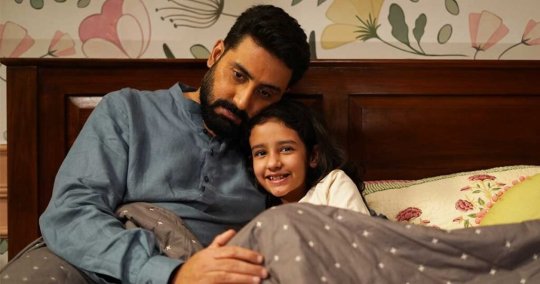
Abhishek Bachchan and Inayat Verma in Be Happy Movie (Credits/Screenshot/Remo D'Souza Entertainment) Production Design Be Happy by Tanvi Leena Patil has a decent production design. The set design enhances the film's visual appeal and transports the audience to the story's setting. The locations are also convincing, and the dancing stage setups appear natural in the film.
Costume Design
Denish Hamirani's costume design represents the creation, background, and personality of the characters in the film. It helps to move the film's story ahead. The outfit design fits the tone and topic of the film. The indigenous culture and traditions of Mumbai have been highlighted.
Background Score.
Harsh Upadhyay composed the background score for Be Happy by precisely mixing conversation, music, and sound effects. The background score appears to be dramatic in various sections of the film. It nicely complements the film's topic and heightens the mood of the tale and situations.
Sound Design
The sound design by Sanjay Maurya and Allwin Rego is natural and effective. It supports the film's concept and tone. Dialogue clarity and blending are also satisfactory. It adds to the film's emotional impact and is perfectly matched with the images.
Choreography
Remo D'Souza's choreography is quite outstanding. Everyone's dancing moves and expressions are profound, depicting situations and feelings. It is consistent with the music and theme of the film. The dance style fits with the song and scenario, It is dynamic and well-executed. It appears to be part of the tale. Some dancing moments, such as those at the auditions and Abhishek Bachchan's song, have made the film noteworthy.
Music
Harsh Upadhyay's soundtrack for the film Be Happy is lackluster. There isn't a single song worth remembering or listening to that makes you want to dance. On which you can dance. The music was effectively used, but it could not have been enjoyable.
be happy song
Pranav Vats' be happy lyrics are pretty weak and ordinary.
Climax
It's the same old climax that we've seen in many movies. There is nothing new about the climax.
Opinion
You should watch Be Happy movie at least once for the excellent dance sequences, movements, and choreography.
Be Happy Rating
4/10
Flaws
The girl's recurring joint problems suggest that she may be suffering from an illness or bone-related issue. The same thing happened, as we realized after watching the film. Bone cancer was demonstrated. The girl's dream was not seen to be realized. Some scenes appear to be pulled from older films. We've seen such films many times before. There was nothing novel or unique. Johnny Lever's performance in the film was underwhelming and wasted. His role was unnecessary regardless.
Fact
The majority of Remo D'Souza's films have English titles. Be Happy Cast: Abhishek Bachchan, Nassar, Inayat Verma and Nora Fatehi (Jay Bhanushali, Punit Pathak, Salman Yusuff Khan, Elli AvrRam and Sonali Bendre in guest roles) Producer: Lizelle D'Souza, Director: Remo D'Souza, Sound Design: Sanjay Maurya, Allwin Rego, Costume Design: Denish Hamirani, Music-Background Score: Harsh Upadhyay, Lyrics: Pranav Vats, Production Design: Tanvi Leena Patil, Editor: Sherwin Bernard, Cinematography: Vijay Kumar Arora, Choreography: Rahul Shetty, Dialogues-Story-Screenplay: Remo D'Souza, Tushar Hiranandani, Kanishka Deo, Chirag Garg, Casting Director: Mukesh Chhabra be happy ottAmazon Prime Videobe happy ott release date14 March, 2025be happy on primeYesbe happy mp3 song downloadYou can download the songs from gaana.com website https://gaana.com/album/be-happy-hindi-2025be happy downloadYou cannot download it as it is running on ott amazon prime videobe happy full movieNo, You cannot download it as it is running on ott amazon prime videobe happy hindi movieYes be happy in hindiYes Read the full article
0 notes
Text
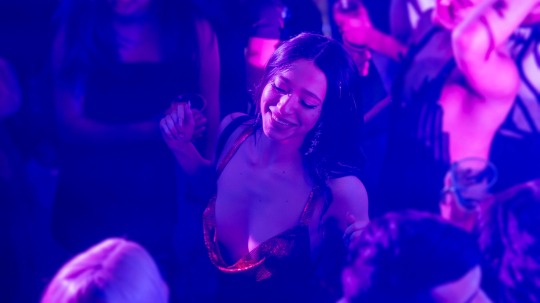
Friday Releases for October 18
Friday is the busiest day of the week for new releases, so we've decided to collect them all in one place. Friday Releases for October 18 include Anora, Woman of the Hour, Rumours, and more.
Anora
Anora, the new movie from Sean Baker, is out today.
Mikey Madison captivates as Ani, a young sex worker from Brooklyn whose life takes an unexpected turn when she meets and impulsively marries Vanya, the impetuous son of a Russian billionaire. However, when Vanya's parents catch wind of the union, they send their henchmen to annul the marriage, setting off a wild chase through the streets of New York.
Woman of the Hour
Woman of the Hour, the new movie from Anna Kendrick, is out today.
Anna Kendrick stars in her directorial debut, Woman of the Hour – the stranger-than-fiction story of an aspiring actress in 1970s Los Angeles and a serial killer in the midst of a yearslong murder spree, whose lives intersect when they’re cast on an episode of The Dating Game.
Rumours
Rumours, the new movie from Evan Johnson, Galen Johnson, and Guy Maddin, is out today.
In times of global crisis, the brightest and biggest brains of the free world gather to provide leadership.
Bookworm
Bookworm, the new movie from Ant Timpson, is out today.
Mildred, an adventurous 11-year-old, dreams of proving the existence of the mythical Canterbury Panther. Accompanied by her estranged father (Elijah Wood), the mismatched duo navigates the wilderness, magic tricks, and an extraordinary quest.
Exhibiting Forgiveness
Exhibiting Forgiveness, the new movie from Titus Kaphar, is out today.
Tarrell (Holland) is an admired American painter who lives with his wife, singer Aisha (Day), and their young son, Jermaine. Tarrell’s artwork excavates beauty from the anguish of his youth, keeping past wounds at bay. His path to success is derailed by an unexpected visit from his estranged father, La’Ron (Jelks), a conscience-stricken man desperate to reconcile. Tarrell’s mother, Joyce (Ellis-Taylor) a pious woman with a profound and joyful spirituality, hopes that Tarrell can open his heart to forgiveness, giving them all another chance at being a family.
Smile 2
Smile 2, the new movie from Parker Finn, is out today.
About to embark on a new world tour, global pop sensation Skye Riley (Naomi Scott) begins experiencing increasingly terrifying and inexplicable events. Overwhelmed by the escalating horrors and the pressures of fame, Skye is forced to face her dark past to regain control of her life before it spirals out of control.
The Line
The Line, the new movie from Ethan Berger, is out today.
Alex Wolff stars as Tom, a scholarship student desperate to break free from his working-class background who is charmed by the prestigious KNA fraternity’s promises of high social status and alumni connections that open doors. But upon beginning a romance with Annabelle (Halle Bailey), a classmate outside of his social circle, and the manipulative schemes of his fraternity president (Lewis Pullman) unfolding during the hazing of new members, Tom finds himself ensnared in a perilous game of ambition and loyalty.
Goodrich
Goodrich, the new movie from Hallie Meyers-Shyer, is out today.
Andy Goodrich’s (Michael Keaton) life is upended when his wife and mother of their nine-year-old twins enters a 90-day rehab program, leaving him on his own with their young kids. Thrust into the world of modern parenthood, Goodrich leans on his daughter from his first marriage, Grace (Mila Kunis), as he ultimately evolves into the father Grace never had.
Hysteria
Hysteria, the new TV series from Matthew Scott Kane and David A. Goodman, is out today.
When a beloved varsity quarterback disappears during the “Satanic Panic” of the late 1980s, a struggling high school heavy metal band of outcasts realize they can capitalize on the town’s sudden interest in the occult by building a reputation as a Satanic metal band, until a bizarre series of murders, kidnappings, and reported “supernatural activity” triggers a leather-studded witch hunt that leads directly back to them.
Rivals
Rivals, the new TV series from Dominic Treadwell-Collins, Laura Wade, and Elliot Hegarty, is out today.
Based on the celebrated novel by Jilly Cooper, “Rivals” dives into the ruthless world of independent television in 1986 — where it’s every man and woman for themselves.
The Devil’s Hour S2
The second season of The Devil’s Hour, the TV series from Tom Moran, is out today.
The Devil’s Hour season two sees Lucy (Jessica Raine) and Gideon (Peter Capaldi) forming an uneasy alliance in order to prevent a recurring tragedy and hunt down an elusive monster.
Teenage Mutant Ninja Turtles: Mutants Unleashed
Teenage Mutant Ninja Turtles: Mutants Unleashed, the new game from AHEARTFULOFGAMES and Outright Games, is out today.
Join the Turtle brothers straight from the sewers and slide into this new adventure of shell-shocking proportions!
RetroRealms Arcade
RetroRealms Arcade, the new game from WayForward Technologies and Boss Team Games, is out today.
Step into a 16-bit Pixel Art world filled with gory good fun as horror legends Michael Myers and Ash Williams! Slice and shoot your way across multiple levels of terrifying platformer action filled with familiar sights and sounds from the original “Halloween” film and the STARZ television series “Ash vs Evil Dead!” Test your skill, use your weapons, and confront twisted and fiendish versions of iconic characters in two separate games that can be connected for even more fun.
Slipping Away
Slipping Away, the new album from Tim Heidecker, is out today.
1 note
·
View note
Text
Breaking Stereotypes: Saniya Iyappan's Strong Stand for Women's Empowerment

Saniya Iyappan, the talented actress from the South Indian film industry, is not just known for her acting skills and dance prowess but also for her strong stand for women's empowerment. In an industry that has been traditionally male-dominated, Saniya has been vocal about breaking stereotypes and advocating for gender equality. In this article, we explore Saniya Iyappan's unwavering support for women's empowerment and the impact she has made in challenging societal norms.
Championing Gender Equality
Saniya Iyappan is a strong advocate for gender equality and has consistently voiced her support for women's rights. She believes in dismantling stereotypes that limit women's potential and hinders their progress. Through her public statements and social media presence, she encourages women to break free from societal expectations and pursue their dreams, irrespective of gender barriers. Saniya's commitment to gender equality serves as an inspiration for women across all walks of life.
Promoting Body Positivity
In an industry that often places undue emphasis on unrealistic beauty standards, Saniya Iyappan has been a vocal advocate for body positivity. She firmly believes that beauty comes in all shapes, sizes, and forms, and rejects the notion that one has to conform to a certain idealized image. Saniya promotes self-love, acceptance, and embracing one's unique individuality. Her positive messaging resonates with many women who have struggled with body image issues and empowers them to embrace their bodies just as they are.
Supporting Women in the Entertainment Industry
Beyond her personal advocacy, Saniya Iyappan actively supports and uplifts women in the entertainment industry. She recognizes the gender disparities that exist and is committed to creating opportunities for other talented women. In interviews and social media interactions, she acknowledges the contributions of her fellow female actors, directors, and technicians, breaking the notion that women are in competition with each other. By promoting collaboration and solidarity, Saniya creates a supportive environment for women to thrive in the industry.
Inspiring Young Girls
Saniya Iyappan's strong stand for women's empowerment has made her an inspiration for young girls all over. She serves as a role model for those who aspire to break free from societal norms and pursue their passion, irrespective of gender expectations. Through her success and advocacy, she shows young girls that they are capable of achieving anything they set their minds to.
Challenges and Pushback
While Saniya's advocacy for women's empowerment has received widespread acclaim, it has also faced some resistance and backlash. Some critics argue that discussions around women's empowerment often exclude other marginalized genders and fail to address intersectional issues. It is important to acknowledge and address these concerns to ensure a more inclusive and comprehensive approach to gender equality.
Conclusion
Saniya Iyappan's strong stand for women's empowerment is commendable. Through her advocacy, she challenges societal stereotypes, promotes body positivity, supports women in the entertainment industry, and inspires young girls to reach for their dreams. Saniya's efforts contribute to the broader movement for gender equality and empower women to break free from the limitations imposed on them. Her influence extends beyond the realm of entertainment and serves as a catalyst for social change.
Sources:
https://www.onmanorama.com/entertainment/entertainment-news/2021/01/17/saniya-iyappan-mollywood-actors-fandom-journey.html
https://timesofindia.indiatimes.com/entertainment/malayalam/movies/news/saniya-iyappan-talks-about-her-passion-for-social-media/articleshow/88232607.cms
0 notes
Text
Bonjourpeople's Exclusive Interviews: Hollywood's A-Listers Speak Out

Lights, camera, action! Hollywood, the land of dreams and stardom, has been a captivating realm that continues to allure movie and pop culture enthusiasts. Behind the glitz and glamour lies a world of A-listers, the crème de la crème of the entertainment industry. In this exclusive series, Bonjourpeople delves deep into the lives of these iconic stars to bring you their untold stories. From heartwarming anecdotes to unexpected challenges, get ready to be enthralled by the candid revelations of Hollywood's finest.
1. The Journey to Stardom: From Humble Beginnings to Shining Success
The path to stardom is rarely a smooth one. It's often peppered with struggles, dedication, and undying passion. For Hollywood's A-listers, this journey was no different. Take, for instance, the remarkable story of Emma Thompson, the award-winning actress. Her tale begins in a small town where she passionately pursued her acting dreams despite facing numerous rejections. Emma's perseverance paid off when she landed a breakthrough role that propelled her to stardom. Such inspiring tales of determination and grit are common among Hollywood's brightest stars.
Similarly, the journey of Matthew McConaughey, known for his versatile performances, was a rollercoaster ride of ups and downs. From auditions in cramped apartments to finally winning an Oscar, Matthew's story exemplifies the resilience required to make it big in Tinseltown. These tales of struggle-turned-success not only motivate aspiring actors but also teach valuable life lessons about the importance of chasing one's dreams against all odds.
2. Hollywood's A-Listers: Beyond the Silver Screen
For many fans, Hollywood A-listers are enigmatic figures that only exist on the silver screen. However, behind the on-screen personas are real people with multifaceted personalities. Kristen Bell, renowned for her roles in both comedy and drama, is an ardent environmentalist who actively works to combat climate change. While entertaining millions, Kristen advocates for a greener and healthier planet, setting an example for her admirers.
Likewise, Ryan Reynolds, known for his charismatic wit, is a philanthropist at heart. His dedication to various charitable causes, including children's hospitals and disaster relief organizations, makes him more than just a charming actor. These revelations showcase that Hollywood's elite are not just entertainers but individuals who use their platform to make a positive impact on society.
3. Navigating Fame and Maintaining Privacy
Fame can be a double-edged sword. While it bestows recognition and adoration, it also robs celebrities of their privacy. Hollywood's A-listers often find themselves hounded by paparazzi and media attention, making it challenging to lead a normal life. However, stars like Jennifer Lawrence have managed to strike a balance between fame and seclusion.
Jennifer's refusal to conform to the stereotypical celebrity image and her candidness about her struggles with fame have won her even more admiration from fans. She emphasizes that it is essential to find moments of privacy amidst the glitz of Hollywood. Her stance has ignited discussions about the importance of respecting celebrities' personal boundaries.
4. Hollywood's A-Listers and the Digital Age
With the advent of social media and the digital age, Hollywood's A-listers face a new set of challenges. From instant judgments on their appearances to dealing with trolls, celebrities have had to adapt to the ever-evolving landscape of the internet. However, some stars, like Chris Evans, have mastered the art of using social media for positive engagement.
Chris's advocacy for various social causes, along with his humorous and down-to-earth approach, has earned him a massive following online. He skillfully navigates the digital realm, utilizing it as a powerful tool to connect with fans, address social issues, and promote his projects.
Stay tuned for more captivating insights into the lives of Hollywood's A-listers as Bonjourpeople's exclusive interviews continue to uncover the secrets and stories of these iconic stars.
That concludes the first heading of this article. Let's continue with the next four paragraphs under the next heading.
5. Redefining Beauty Standards: Empowerment in Hollywood
In an industry often obsessed with appearances, Hollywood's A-listers have been at the forefront of challenging conventional beauty standards. Emma Stone, an Oscar-winning actress, has been vocal about the importance of embracing individuality and self-confidence. Her refusal to conform to societal norms has inspired countless fans to feel comfortable in their own skin.
Similarly, Chadwick Boseman, known for his iconic role as Black Panther, has left a lasting impact on empowering black actors and filmmakers. He believed in the significance of representation on screen and used his fame to advocate for a more inclusive and diverse Hollywood. These trailblazers have shown that true beauty lies in embracing uniqueness and celebrating diversity.
6. Behind the Scenes: The Unsung Heroes of Hollywood
While the spotlight shines brightly on Hollywood's A-listers, there are countless individuals working behind the scenes, ensuring the magic of cinema comes to life. From directors to costume designers, the contributions of these unsung heroes are immeasurable. Take, for instance, the acclaimed director Christopher Nolan, whose innovative storytelling and visual mastery have redefined filmmaking.
Moreover, the brilliant costume designer, Sandy Powell, has won multiple Oscars for her exceptional work in bringing characters to life through wardrobe. The dedication and creativity of these talented artists contribute significantly to the success of the movies we love.
7. Evolving Artistry: Hollywood's A-Listers as Creative Visionaries
Beyond their acting prowess, many Hollywood A-listers have ventured into other creative realms, proving their versatility as artists. Donald Glover, also known as Childish Gambino, has excelled not only as an actor but also as a rapper, singer, and writer. His ability to seamlessly transition between various art forms showcases his multifaceted talent.
Additionally, Lady Gaga's evolution from a pop icon to an acclaimed actress has been nothing short of remarkable. Her performance in "A Star is Born" earned her critical acclaim, solidifying her position as a creative visionary. These celebrities redefine the boundaries of artistry and inspire others to explore their passions fearlessly.
8. Impactful Philanthropy: Giving Back to Society
Hollywood's A-listers have consistently shown their commitment to giving back to society through philanthropic endeavors. Angelina Jolie, a prominent actress and UNHCR Goodwill Ambassador, has dedicated herself to humanitarian causes around the world. Her advocacy for refugees and vulnerable communities has earned her widespread respect.
Likewise, Leonardo DiCaprio's passion for environmental conservation has led him to establish the Leonardo DiCaprio Foundation, which focuses on protecting wildlife and combating climate change. These philanthropic efforts exemplify the power of influence that celebrities possess to make the world a better place.
Stay tuned for more exclusive insights into the philanthropic endeavors of Hollywood's A-listers in the upcoming sections.
0 notes
Photo
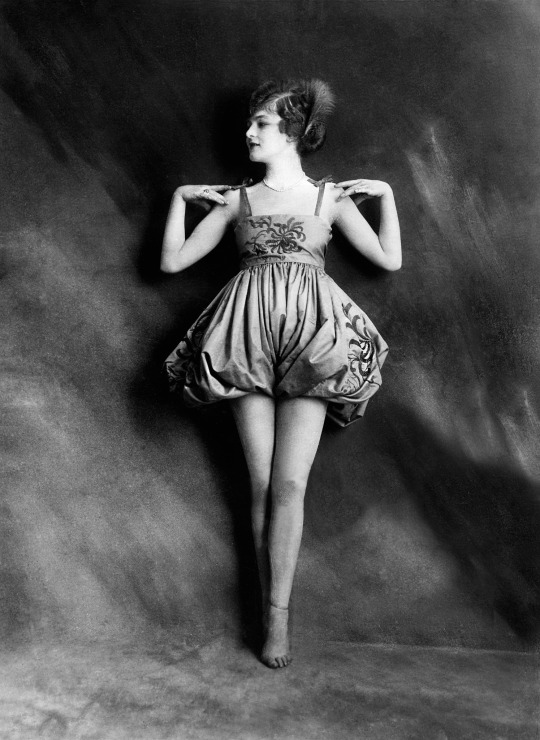
"Anita Berber was born into a middle-class family with artistic leanings. Her father, Felix, was First Violinist of the Municipal Orchestra, and her mother Lucie was a dancer and aspiring actress. After her parents’ divorce, Berber lived with her grandmother. In 1913, she attended a modern dance school where she learned rhythmic gymnastics. She later studied traditional ballet in Berlin.
Germany from the end of World War I until the rise of the Nazi party in 1933 was a time of both economic instability as well as artistic creativity. The art world embraced Expressionism, and the cabaret scene exploded with risque performances thanks to a loosening of censorship laws. By the age of 20, Berber was performing nude in many of these cabarets.
In 1919, Berber married the wealthy screenwriter Eberhard von Nathusius. They divorced after she fell in love with a lesbian bar owner, Susi Wanowski, who became her manager as well as her lover.
Besides dancing in cabarets, Berber also made more than a dozen appearances in film, including a role in the 1919 silent film Different From the Others. This film is often considered the first sympathetic portrayal of homosexuality on screen. The movie was a direct challenge to Germany’s laws against homosexuality, and the Nazis later banned it.
Berber’s bisexuality and her overall defiance of traditional gender norms were often the subject of the tabloids. Berber reportedly had a brief liaison with a young Marlene Dietrich, the Hollywood star known for her sexy androgynous style.
In 1922, Berber married the dancer Sebastian Droste and the two of them created a book of poetry and photography titled Dances of Vice, Horror and Ecstasy, which they also performed in various nightclubs. They both struggled with alcohol and drug addiction, most notably cocaine, and their performances and poetry often included references to drugs.
Berber and Droste’s performances continued to shock and outrage the public. She was jailed for several weeks after personally offending the king of Yugoslavia with a nude dance performance. As a result they were both banned from performing in European venues for several years. Reports of scandalous behavior followed Berber wherever she went. She was often seen around town with her pet monkey draped around her neck. There were reports that she visited restaurants naked but for a sable coat. After Droste was jailed for fraud (he also stole Berber’s furs and jewelry), Berber met and married American dancer Henri Chatin-Hoffman in 1924, two weeks after they met.
In 1928, Berber collapsed during a performance at a Beirut nightclub. A few months later she died from tuberculosis, most likely the result of years of drug abuse. Following her death, an unflattering and largely fabricated biography emerged, which shaped Berber’s legacy for decades. More recently she’s been seen in a new light, thanks to LGBTQ+ and feminist studies. Berber was an early performance artist at a time when that label didn’t even exist.
#Anita Berber#bisexual#performance artist#1920s#Germany#lgbt#lgbt+#lgbtq#lgbtq+#queer history#bisexual history
469 notes
·
View notes
Text
Okay, so, about a month ago, my brain just conjured up probably the most random au possible: Legally Blonde Adam Banks/banksway au.
Believe me, it's as chaotic as it sounds, but lowkey, I'm kind of in love with it.
Adam never joins the Ducks because there aren't any Ducks to join. Bombay never had to do community service with District Five so there was no one to realise that Adam was on the wrong team all along. He continues to play for the Hawks and, eventually, the Eden Hall Warriors, never getting the chance to become the well-rounded individual we know him as because he's never known anything other than his rich privilege and the "win at all costs" mentality. He ends up going to college on a hockey scholarship and not straight to the NHL or the AHL (shocking, I know). While he's unsure of his major and where his life is heading, he finds solace in the fraternity he joins, which, by some sheer twist of fate, Jesse and Guy have also miraculously joined.
And his life is perfect for a while. He's the star player on yet another school's hockey team, all of his fraternity brothers adore him (though, it took a bit for Jesse to warm up to him), and his secret, not-really-official thing with his former teammate is going swimmingly. (Not to slander my boy, but I was picturing Larson for the role of Warner, purely because the alternative seems to be Rick Riley and that's kind of an unsettling image-- though, maybe that's the point?)
But then his secret boyfriend breaks up with him because, with his high aspirations in life, he needs to be "more serious." And dating Adam Banks, a guy in a stereotypical fraternity who only really knows hockey, in 2001 isn't exactly the white-picket-fence life he's looking for if he's going to be a politician.
And since this non-Duck Adam clearly doesn't have the braincells that canon Adam does, in his devastation, he decides it's a brilliant idea to prove that he is serious by applying to Harvard Law. His parents try to talk him out of it, since they want him to pursue his dreams of hockey, but being a lawyer is a respectable career so they can't exactly argue with him.
He gets accepted thanks to Jesse, Guy, and the rest of his fraternity helping him study for the LSAT and keeping him on track. He's trying his darndest when he gets to Harvard, but (despite his struggle not being as significant as Elle Woods'), not a lot of people take him seriously as an aspiring lawyer, considering him a meathead jock who only got in because of daddy's money.
And that's about the time he meets Linda, who he vaguely remembers from his time at Eden Hall. What he doesn't remember is her being so competitive, because she's deliberately beating him at every turn, just trying (and kind of succeeding) at making him look like a fool. To make matters worse, all of the sudden, she's engaged to his ex-boyfriend, who is very adamant about never telling anyone that he and Adam were more than friends (because, you know, early 2000s homophobia and such).
But things get a little brighter for Adam when he meets Charlie, an undergrad teacher's assistant who gives him all sorts of advice about surviving the school. He introduces him to Professor Bombay, who Charlie claims is the only reason he survived his first year and quickly becomes Adam's favourite teacher, and Charlie's childhood friend Connie, who aspires to be a state senator one day. Charlie's charismatic and even if he's not the most well-liked person at Harvard, Adam feels a weight lifted off his shoulders once he becomes friends with him and Connie. Things become a little easier.
Just before he and Charlie start getting really close, Adam meets Casey at a local diner on a day he's feeling particularly upset and alone, and the two start bonding almost immediately. (He bullshits his way into scaring an ex-husband of hers with legal repercussions he has no idea about and she basically adopts him in return.) It takes him an embarrassing amount of time to realise that it's not just a coincidence that Casey and Charlie share the same last name, which results in poor Adam feeling extremely embarrassed for not connecting the dots sooner while Charlie's having the time of his life teasing him for it. Eventually, when the dust of that settles, Charlie and Adam join forces to set Casey and Bombay up, their schemes borderline ridiculous at times, but they'rere not exactly failing.
And after realising he isn't the Warriors moron she thought he was for going on five years, Linda starts warming up to Adam, which is surprisingly nice? She figures out on her own that there used to be something between him and her fiancé, and is more understanding of Adam than she is mad. Linda actually spills to him the lengths Adam's ex had to go through to actually get into Harvard, aligning more with the rumours about Adam's acceptance being bought than having the aptitude for the law that Linda and Adam share. (This may be me saying Linda and Adam friendship rights, what of it-- /lh)
To make things all the better, Bombay chooses Adam, Linda, Connie, Charlie, and Adam's ex to be on his legal team for a murder case he's responsible for (and while he knows about Adam and Charlie's ploys to hook him up with Charlie's mom, they're his favourites, so he doesn't say anything).
And this is just so much better than anything he had before. After all the initial unpleasantness, Linda and Connie become some of the most genuine friends he's ever had. He misses Guy and Jesse, of course, and he'd never take them for granted, but back when he was with them at the fraternity, a part of him was still being as superficial as he had been in middle and high school. Being authentic for once in his life is liberating.
And Charlie's just about the most considerate person Adam's ever met. Adam doesn't even mind when Charlie teases him over his absurd and juvenile insults because he's just this source of light for Adam, supporting him and always pushing him to be the best version of himself. His ex hardly even exists when Charlie's around because his energy is just so contagious that Adam starts falling for him long before he even realises it. (And when Jesse and Guy come to visit, there's a moment where it all clicks and the four of them realise their history together, however brief. I strongly maintain that they'd be that Starkid meme: "Fucking Hawks? We hated you guys!" "We hated ourselves!" But it does make Adam realise how much better off he would've been if he had Charlie and his team when he was little instead of the Hawks, and it just further makes him understand that people like Larson and Rick Riley just aren't worth it.)
But there's also another revelation Adam goes through. Between helping Casey, his rigorous studies, and his position working with/for Bombay, something just clicks for Adam. He likes being able to help people, fighting for the good guys who may not have the resources they need to be properly defended. Practicing law calls to him in the same way hockey did; it's the feeling of knowing this is what he's meant to do. He still loves hockey, he always will, but it helps him finally grasp that there's a world for him outside of it; when hockey ends for him, there's something equally as rewarding that he can pursue, which was something he never thought he would have.
I haven't a single coherent thought about this au past that point except for these little inklings of an ending--
There's absolutely no SA scene like the movie had; Bombay's just Adam and Charlie's favourite teacher and those are his boys, so he's going to make sure they succeed as if his life depends on it.
With that said, Bombay believes in them both enough to let them finish the case because with their joined determination/stubbornness (and Adam's in with the defendant), Adam and Charlie are a force to be reckoned with and he knows it.
After a handful of comedic failures, they do end up succeeding at their attempts to set Casey and Bombay up, and they start living together sometime during the kids' Junior year :) (All I'm asking is for one (1) story with a Casey/Gordon endgame-- I just think they're neat--)
Linda dumps her fiancé (as she should) and goes on to live her best wlw life as a successful lawyer. (If I'm not mistaken, Linda's actress actually is a lawyer, which is a pretty cool fun fact!!)
Adam and Linda's ex gets the Warner ending because, man, screw that guy /lh (rip to Larson if this is him, I'm sure you'll get a nice endgame in some other universe, king)
Honorary mention for Connie, who was going long distance with Guy this entire time to everyone but Jesse's shock, and they get their Game Changers endgame of State Senator Connie Moreau and stay-at-home dad Guy Germaine with their seven -- sorry, three -- children :)
Adam's an absolute bundle of nerves after graduation, which definitely concerns Charlie. So, when he asks if he's okay, Adam starts nervously monologuing about their time together until he runs out of breath. He ends it by proposing to him, and Charlie smiles so surely at him when he says yes. They both become damn good public defenders and stay engaged until the point they can legally get married, but they're practically husbands long before that happens.
Also, if I did my math right (which I should’ve, it’s my entire basis for my Share Your Address series), the Ducks’ would have the same graduating class year as Elle Woods anyway (2004), which is pretty neat!
Thank you once again for listening to me ramble :)
#i just think they're neat that's all--#full disclosure: i have not listened to/seen the musical yet but I have heard very good things about it#adam banks#charlie conway#gordon bombay#linda the mighty ducks#connie moreau#banksway#charlie x adam#the mighty ducks#casey x gordon
59 notes
·
View notes
Text
Why Kyoko Mogami is the GOAT
And why y’all are SLEEPING ON HER
Spoilers for Skip Beat, but honestly idk how much of the story I’m gonna get into for this since I’m flying by the seat of my pants. Still, read at your own risk.
Also this is LONG lmao
Kyoko Mogami is a 16 year old middle school drop-out that works two jobs day and night in order to pay rent for the Tokyo apartment that she lives in all by herself 6 days out of the week. Going into the first chapter, there are three things immediately clear about her.
1. She’s cheerful, kind, and also kind of batshit insane. From the first moment we meet her, her personality is throwing itself at our faces and refusing to calm down. (apologies for the bad quality images, I work with what I have)
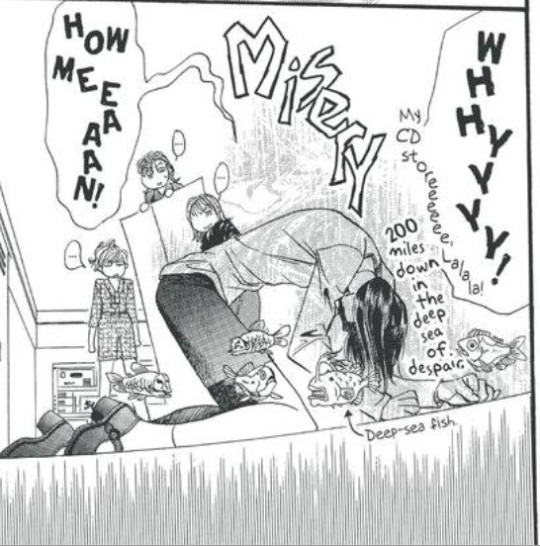
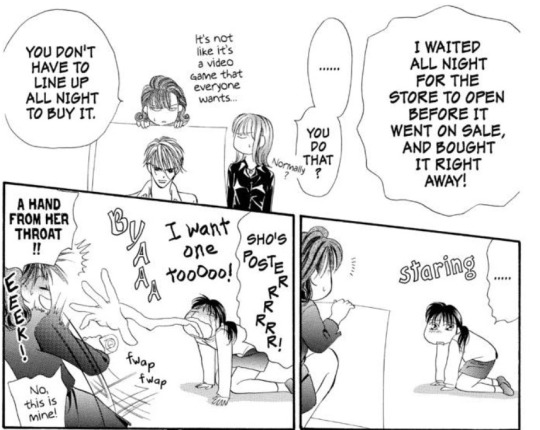
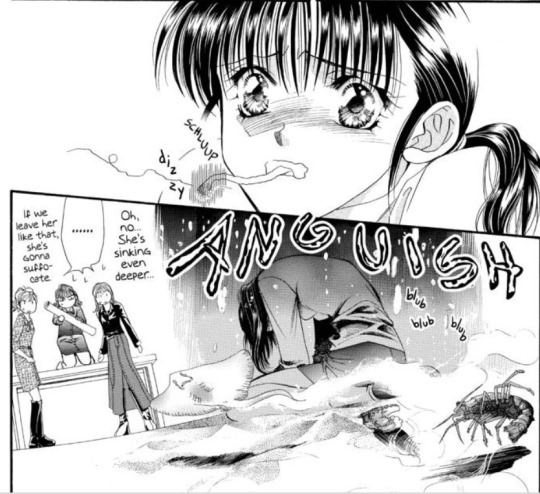
2. She loves Sho Fuwa, her childhood friend and rising rock-star that asked Kyoko to come with him to Tokyo after middle school graduation to support his career

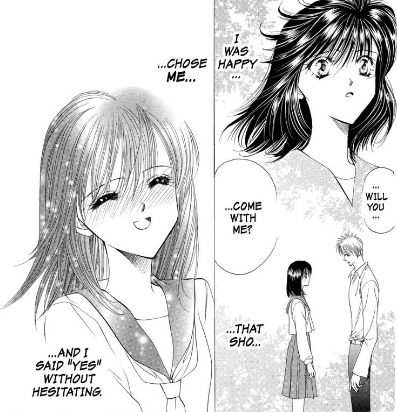
3. Nothing matters to her as long as Sho is happy. Sure, she laments that her love for girly dresses, cosmetics, and fairy tale princesses will never amount to anything since all of her money is going toward paying the rent on her and Sho’s apartment, but that’s fine. As long as her precious Sho is happy, so is she.
And, as you’d expect, things go to shit pretty quickly afterwards. During one her off days from her night job, Kyoko decides to visit Sho at his recording studio with dinner. After sneaking in past the hoards of squealing teenage girls waiting outside to catch a glimpse of him, she overhears him talking to his manager.
“I’m the heir to a prominent Japanese inn, do you think I’ve ever cooked or cleaned all by myself?” She hears.
“That’s awful,” the manager replies, “you make it sound as if you brought her just to be your maid.”
“She’s basically been my maid since I was a kid, or else I wouldn’t have brought her along with me. It’s not like I forced her, I asked her a question and gave her the choice. It’s only natural that she’d work her butt off to support me.”
And he just keeps going. Once he’s made enough to live independently, he’ll send her back. How dare his parents try to set him up with a plain-looking girl like her. She doesn’t even wear make-up!
As images of flash in Kyoko’s mind of standing in front of make-up stores with no money to buy anything, she takes Sho’s words just as well as one might expect. By unleashing the box of tucked away emotions she’s held in her chest and swearing to take revenge on Sho for using her and throwing her away like this.
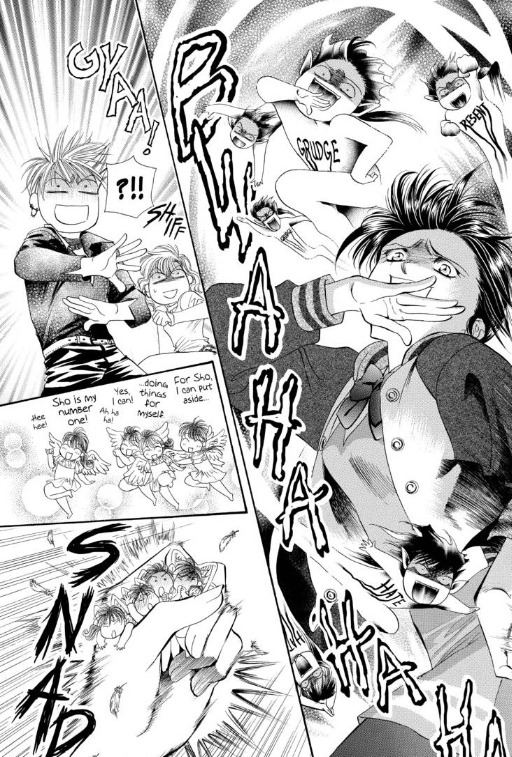
. I failed to mention this at the start, but the beginning of the chapter introduces us to the most important piece of symbolism in Kyoko’s character development: Pandora’s box.
For Kyoko’s entire life, she’s held this box inside herself. In myth, once this box was opened, all of the evil of the world is unleashed, never to be put back inside. So for Kyoko, the metaphor is quite apt. Hearing Sho’s words unlocks the box and unleashes a kind of anger that not even Kyoko knew she was capable of, a kind of determination and vengeance that has her dyeing her hair and staking outside of a talent manager’s house for days on end to whittle down his willpower and give her a chance to audition at Sho’s rival talent agency, LME. Every time she hears his name, or sees his picture, she’s filled with myopic sense of rage that no one can calm her down from.
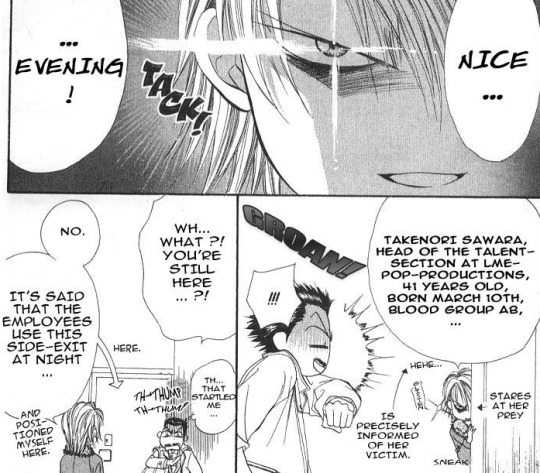
Her sole mission in life is to get revenge on Sho Fuwa, a sentiment that finds her at odds with LME’s top actor, Ren Tsuruga, who sees her one-sided quest for vengeance as an insult to people who truly love acting. But as if Kyoko cares, she needs to get revenge!
I’m gonna drop the pseudo-narration for a bit because I actually need to skip over a fair bit of plot to get to what I think makes Kyoko incredibly compelling, outside of being the funniest female character in existence. We’re going to jump forward in time to Kyoko’s first acting gig. Well, not so much an gig as much as it is a competition. She’s been tasked to play the role of a dignified inn keeper that’s serving tea to the main male character. After having broken her ankle and been challenged by the real lead actress, this is her first shot to prove she has the talent to make it in the acting industry. So in order to immerse herself in the role, she utilizes her experience of being trained by Sho’s mother to take care of the inn that his family owned. It’s here that we finally understand that Kyoko giving up her life back home for Sho wasn’t just a spur of the moment decision brought about by infatuation. It was something she’d been doing for her entire life. Everything she knows how to do, every skill she’s obtained, has been because of Sho. And this is the moment that she realizes that fact too. (the first image is from after the scene is done, wherein Kyoko cannot snap herself out of her character due to the lessons she was taught as a child, despite her sitting position making her broken ankle unbearably painful).
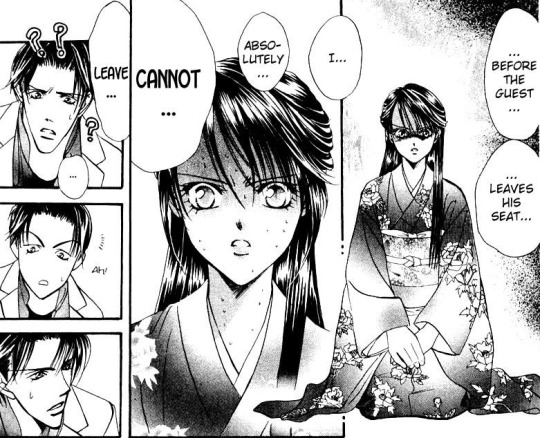

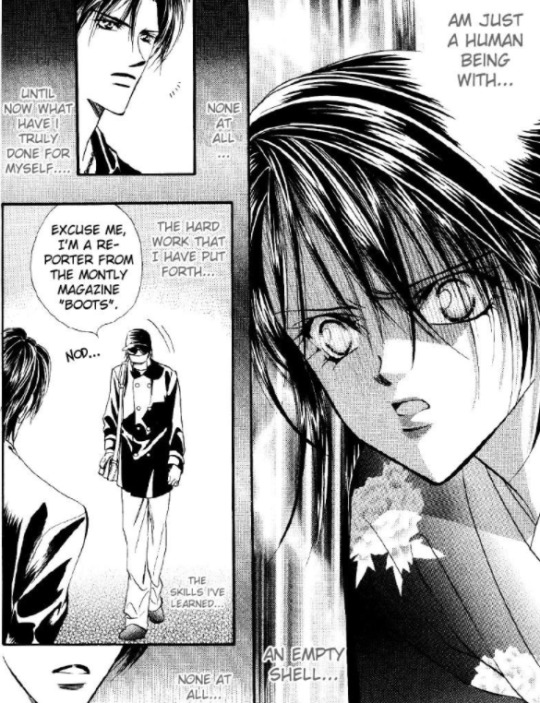
Even her righteous fury at being left in the dust is focused solely on Sho fucking Fuwa. Is there anything that she has than can be attributed to her own success? Does she have any skills that can’t be traced back to trying to make Sho happy? Who is Kyoko Mogami? Is she worth anything without Sho?
And I want to make this clear right now, because I know the term “shoujo” makes people hesitate. THIS is what Skip Beat is about. Kyoko’s journey to find out who she is, and with every new role she takes on and with every experience she gains, she becomes just a little closer to finding out who she is and what she wants for herself.
We watch as her love for acting slowly eclipses her thirst for revenge. A few arcs after this moment, she is contacted about a job to act in a music PV with none other than Sho himself. In the beginning, she accepts the job in order to prove to Sho that she’s climbing the ladder and catching up to him, but her performance suffers whenever she thinks about her revenge. And what saves her isn’t even putting aside her revenge, but prioritizing her own feelings above it. She wants to act! She wants to put on a good performance! So she needs to put aside those feelings of anger and draw from her past experiences to create a character that leaves Sho in the dust.
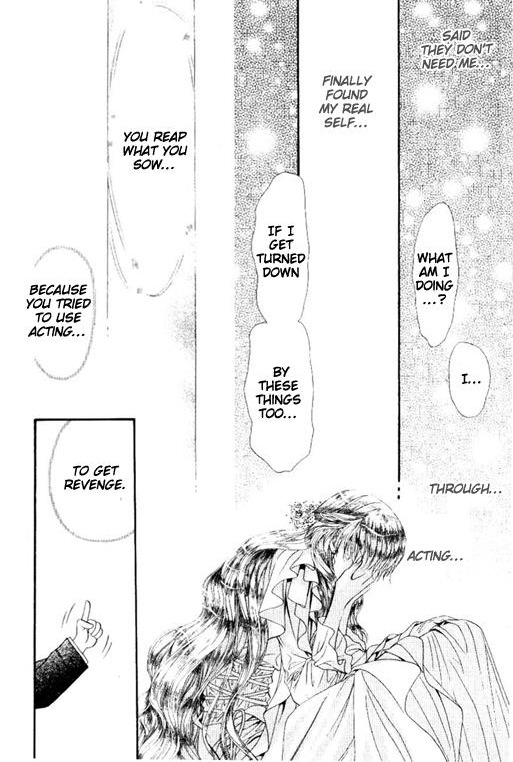
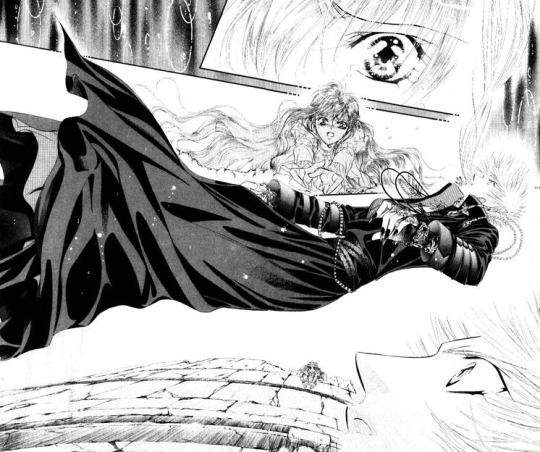
I’m gonna bet y’all are wondering about the romance, though. Because this is a shoujo, and of course it has romance. But hey, guess what? That romance is equally compelling and is an integral part to Kyoko’s character too. In the first....5 or so arcs, Ren Tsuruga ‘s relationship with Kyoko crawls it’s way out of the it’s rocky beginnings, and he slowly becomes a mentor figure to Kyoko. He’s her superior in acting, and she looks to him often for support and guidance when she’s struggling to perform a role or having difficulty with her fellow actors. To Kyoko, Ren is the goal, his level of acting is what she aspires to be, so she can stand on equal footing with him. Before there’s even a whiff of romance between them, there develops a solid bond of trust and support. And once the romance starts. Hoo boy.
To fully understand why it’s taken 12 years irl for a confession scene to finally take place, we need to bring back the metaphor of Pandora’s box. Because not everything escaped Pandora’s box when it was opened. Pandora was able to shut the box just in time for one thing to stay locked inside: hope. In the myth, this is a good thing, while negative and vile emotions run free, hope still exists within people to become better. But for Kyoko, the box isn’t a safe place, it’s a repressed place. She spent her entire life locking away the negative emotions she felt, placing a smile on her face and hoping for Sho’s happiness. And when those emotions are set lose, she locks the box back up, sealing something else inside. Her hope, her confidence in anything having to do with love.
It’s not just that Kyoko isn’t in love anymore, she feels as if she can’t be in love anymore, that she’s entirely incapable of it. The idea of falling in love with someone else terrifies her. What if she goes back to the way she was before? An empty shell that exists for other people and not herself. The box has been sealed tightly again, and by God this time she’s not going to let anything open it. And like, I don’t want to spoil much in this, as contradictory as that sounds. Because the scene where she realizes she loves Ren? One of the best fucking scenes in any romance manga ever.
And. God. I haven’t even touched on her mom. Kyoko’s desire for love, that became so warped under Sho and so desolate after his betrayal, can all stem back to Saena Mogami. A woman who, no matter what Kyoko did, rejected any affection that her child tried to give, and gave none in return. “Even a mother can hate her own child.” We get bits and pieces of what Kyoko’s mother was like, and the environment that a very young Kyoko was raised in before her mother left her in the care of Sho’s parents. And eventually we realize that Kyoko isn’t afraid of her love being rejected twice, but a third time.
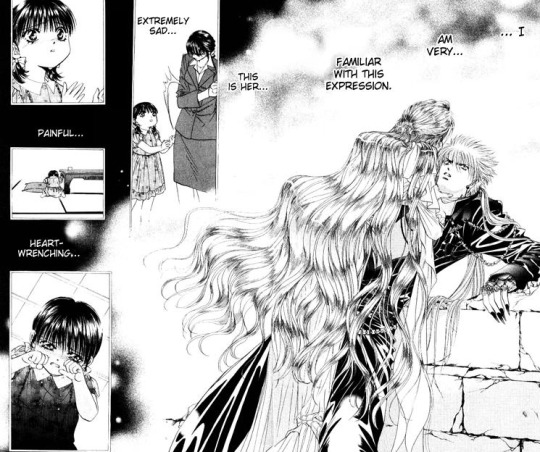
Like, y’all, I’m not good at these kind of essays. I keep wanting to go off on tangents, nothing is ever focused, I spend to much time just reading the manga instead of writing this fucking post. But please believe me when I tell you that Kyoko Mogamis character development is like none other. She’s truly at the top of her genre and it’s an actual crime that she’s so underrated.
I HAVEN’T EVEN TALKED ABOUT KANAE, THE WEISS TO HER RUBY, THE TSUNDERE TO HER GENKI
Before Kyoko gets even a single arc with Ren, she gets two with Kanae. The first with Kanae as a central figure, and the second where Kanae is her support. She’s the one that gives Kyoko the eureka moment she needs to pull of her performance with Sho. They are one of the most developed and deep friendships in shoujo that I’ve ever seen AND Y’ALL NEED TO STOP SLEEPING ON IT. LOOK AT THESE TWO
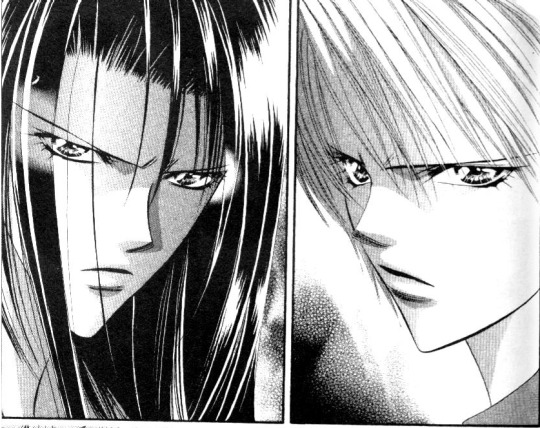
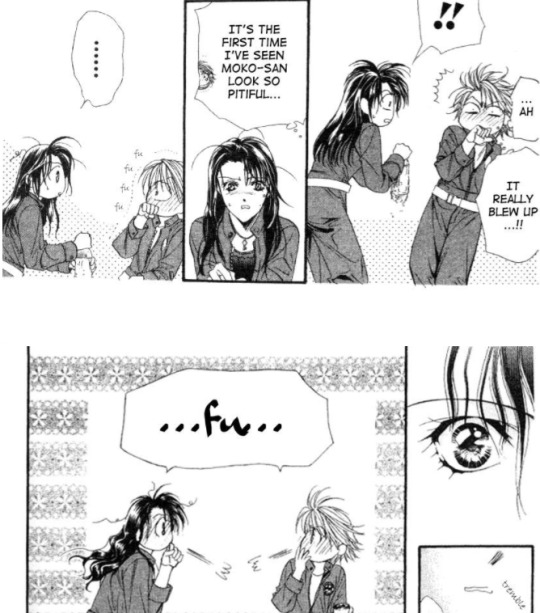
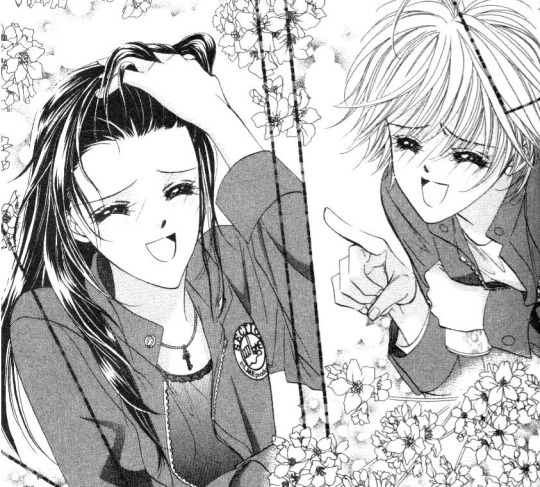
And don’t take this poorly assembled post at face value, I’ve left out a lot of shit. Starting with how fucking funny this manga is. Kyoko’s special talent for her LME audition is peeling vegetables, there’s a running gag where Ren asks for her advice while she’s in a giant chicken costume, unaware that it’s her, the president of LME is an eccentric millionaire that likes to dress up in different themed costumes every day and loves throwing extravagant parties, Kyoko’s hobby is making voodoo dolls and talks to a miniature Ren doll whenever she needs encouragement or advice.
And it’s all packaged alongside some of the most compelling character development I’ve ever seen (for both Kyoko and Ren), and some absolutely heartbreaking drama. You will never know true pain until “I don’t have a daughter.”
Read this, ya’ll. You won’t regret it.
#I'm not going back over this because I KNOW it's not coherent but FUCK IT#skip beat#rambling#long post
173 notes
·
View notes
Text
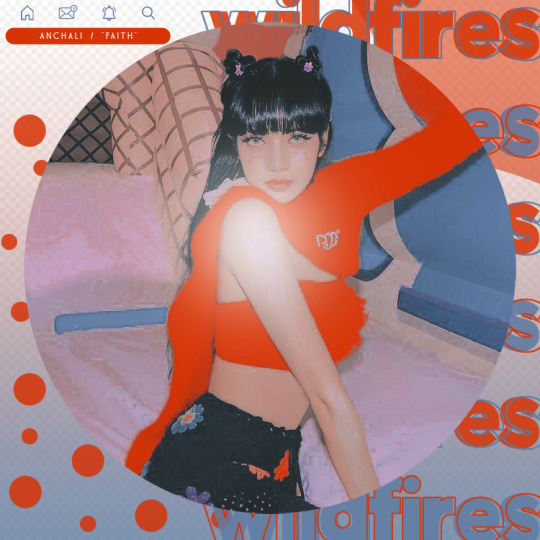
template credit: X
*waves* bonjour & bon jovi everyone! i'm really stoked to be here, as i've been eyeing the premise of this group for quite some time, and finally found the courage to bring a muse in! and what a messy lovely muse she is. no but seriously i have a soft spot for her and am super excited to write her with you all! so if you'd like to read more about this rebel with a cause who's still struggling with loving herself in some complex ways, pls do click the cut below for some quick info and important links that will delve more into detail! as always, if any plots interest you, or if you'd just like to plot something based on chemistry / muse personality, feel free to ♡ this post, and i'll im you to chat! ( oriewortireo unfortunately i'm a boomer trapped in a 23 yo's body who doesn't use discord 🤡 )
tw: child abuse / abandonment, drug & alcohol use
so faith's full biography can be found here, you can view some stats over here, and finally, there's some wanted plots on this page right here! below is a slightly condensed version of her backstory so you can get the gist of everything! :)
faith had a very abusive upbringing at the hands of her mother, who was a rather famous actress who'd made the transition from thailand to south korea, and become a huge star in their film and drama industry.
despite the woman's fame and success, she had a horrible reputation among her peers due to the underhanded and downright cruel things she'd do to others in the profession to get herself ahead.
after faith's father was discovered having an affair with the family's maid, he left the home behind as well as his daughter. faith's mother's anger only got more intense, at having her perfect family image destroyed in the public eye.
her daughter bore the brunt of this anger, of course, as she was the only target the woman had left. she'd found a way to blame faith for the separation and eventual divorce, as it seemed to easiest way for someone so vitriolic to deal with rejection.
faith eventually came to believe the vile things her mother told her, developing an unhealthy dislike for herself and an appetite for self destruction as she entered her teens and began attending hannam.
she'd go to parties she was too young for; drinking, inhaling or swallowing any hallucinogen anyone would offer her, just wanting to feel anything but her mother's tight, painful grip on her wrist. wanting to hear something other than morbid threats, teardowns and insults was essentially the only thing keeping her going. chasing the next high to cope with the crushing lows.
on one particular weekend, she and a couple of friends from hannam high school snuck into a nightclub. after some illegitimately attained cocktails and a dare, the group took over the dj booth while the dj was in the bathroom.
this was the night faith fell in love with the idea of being a dj. the crowd, the music; sounds filling her ears besides her mother's shrill voice? it was the escapism she'd always been searching for.
it was through her journey to learn the craft that she met the person who'd have a huge impact on her life, for better and for worse.
he was the lead singer of a fairly popular band, even though faith wasn't overly familiar. he seemed sweet and nice; like another escape to her. he was helpful with her musical aspirations, making her feel like she really mattered. she eventually was even able to book paid jobs at clubs thanks to his influence.
and there were a couple of happy years out of it, during which faith thought she'd finally found a light beacon in the storm she'd been navigating since she was a child. the only thing that seemed strange was his insistence on keeping things a secret.
there turned out to be a reason for it; he had a penchant for keeping a whole slew of girls in the wings to satiate his desires. one of them happened to be an actress, and things had gone public on a gossip news site; this is precisely where faith had the privilege of learning the news.
after breaking things off, it was all faith could do to pour herself into her deejaying and become a fvcking badass who put herself first (sometimes). she became something of a local celebrity in seoul on the club circuit, and even took to making original music rather than just remixing the works of others.
her diligence earned her some local airplay on a small electronica radio station, and hearing her own original song emanating from an actual, real radio station was the most awash in true confidence she'd ever felt.
sadly just moments later, she had the wind knocked out of her when she stumbled upon another song while changing the dials; one by her ex's band. the song was very clearly about her, with the euphemistic title 'i had faith', and it was full of intimate references to her and the things they did together. it also contained allusions to some of the darkest secrets she'd told him, and taunts about how he'd made her everything she is. she was disgusted.
it destroyed faith and rebuilt her at the same time. she decided she now existed solely to prove that she could achieve any and everything on her own; that she didn't need some fuckboy's influence to see her dreams come true.
she now has a pretty nice apartment, not too far from her old stomping grounds at hannam high school. she still struggles with believing she deserves love, or anything, really but she's a great deal closer to that goal than she was at the start!
11 notes
·
View notes